A Bride For Isaac – part 1
We have come in chapter 24 to a major break in this second division of Genesis.
- The first division (chapters 1—11) deals with four great events.
- The second and final division (chapters 12—50), deals with four outstanding individuals.
Specifically, in Genesis 12—23 we have Abraham, the man of faith. Now in chapters 24—26 we have Isaac, the beloved son. There are three great events in the life of Isaac, and we have already seen two of them.
The first was his birth, and the second was his being offered by Abraham. The third is the obtaining of his bride.
They say there are three great events in a man’s life—his birth, his marriage, and his death—and that he has no choice except with the second one, marriage.
Sometimes a man doesn’t seem to have much choice in that connection either, but, nevertheless, these are the three great events in a man’s life. We come now to the story of how Isaac secured his bride.
Abraham sends his trusted servant back to the land of Haran in Mesopotamia to get a bride for Isaac—and we will see the success of the servant in securing Rebekah. This is a very wonderful love story.
It reveals that God is interested in the man whom you marry, young lady, and He is interested in the young lady whom you marry, young man.
There are two institutions that God has given to the human family: one is marriage, and the other is human government (God permits man to rule himself today). These are two universal and very important institutions.
When these are broken, a society will fall apart. The home is the backbone of any society—God knew that—and He established marriage, intending that it give strength and stability to society.
The same thing is true relative to human government—a government must have the power to take human life in order to protect human life—that is the purpose of it. Because human life is sacred, God gave such laws.
The point here is that God is interested in your love story, and it is wonderful when you bring God into it. The first miracle that our Lord performed was at a wedding in Cana of Galilee. I do not know how many weddings He went to, but He went to that one.
The twenty-fourth chapter of Genesis is one of the richest sections of the Word of God because it tells a love story that goes way back to the very beginning.
A very dramatic account is given here of the way that a bride was secured for Isaac, and again, a fantastic spiritual picture is also presented to us. There are two things that I want you to notice as we go through this chapter.
One is the leading of the Lord in all the details of the lives of those involved. It is a remarkable statement that is made, time and time again, of how God led. Even in this early day, there were those in that social climate who were looking to God and following His leading.
Some would have us believe that this took place in the Stone Age, when man was a caveman and pretty much uncivilized. Don’t believe a word of it! Here is a record that shows that man did not start out as that kind of man at all—and we find here the leading of God.
If God could lead in the lives of these folk, He can lead in your life and my life. Genesis 24 describes in great detail how Rebekah came to be the wife of Abraham’s son Isaac.
The story begins with what sounds like a deathbed scene, though Abraham will apparently live another 35 years.
Abraham summons his oldest and most trusted servant and commissions the man with a specific mission: He must find for Isaac a wife from among Abraham’s people back in Mesopotamia.
Abraham is so urgent that he requires the servant to swear an oath binding himself to completing this task.
More specifically, the servant must not allow Isaac to marry a Canaanite woman, but Isaac must not leave Canaan in order to marry a Mesopotamian woman (Genesis 24:1–4).
Genesis 24:1-4 KJV
[1] And Abraham was old, and well stricken in age: and the LORD had blessed Abraham in all things.
[2] And Abraham said unto his eldest servant of his house, that ruled over all that he had, Put, I pray thee, thy hand under my thigh:
[3] And I will make thee swear by the LORD, the God of heaven, and the God of the earth, that thou shalt not take a wife unto my son of the daughters of the Canaanites, among whom I dwell:
[4] But thou shalt go unto my country, and to my kindred, and take a wife unto my son Isaac.
Genesis 24:1 KJV
And Abraham was old, and well stricken in age: and the LORD had blessed Abraham in all things.
 His anxiety to see his son married was natural to his position as a pastoral chief interested in preserving the honor of his tribe, and still more as a patriarch who had regard to the divine promise of a numerous posterity.
His anxiety to see his son married was natural to his position as a pastoral chief interested in preserving the honor of his tribe, and still more as a patriarch who had regard to the divine promise of a numerous posterity.
Abraham was old and full of years. Scripture often uses this language at the end of a person’s life to set up their final actions. Abraham, however, will apparently not die for another 35 years or so (Genesis 25:1–11).
In fact, he will marry another wife and have several more children. Still, Abraham’s conversation as reported in this chapter contains his final recorded words in Genesis. Many times in Genesis, God promised to bless Abraham.
This is one of the few verses which indicate that God had, indeed, blessed him “in all things.” In addition to the birth of Isaac, God had blessed Abraham with great wealth and status in the land.
He had not yet received the promised possession of the land of Canaan promised to his offspring, but Abraham was known as a man blessed by God in all things.
Genesis 24:2 KJV
And Abraham said unto his eldest servant of his house, that ruled over all that he had, Put, I pray thee, thy hand under my thigh:
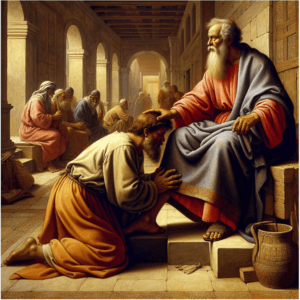 Abraham being too old, and as the heir of the promise not being at liberty to make even a temporary visit to his native land, was obliged to entrust this delicate mission to Eliezer, whom, although putting entire confidence in him, he on this occasion bound by a solemn oath.
Abraham being too old, and as the heir of the promise not being at liberty to make even a temporary visit to his native land, was obliged to entrust this delicate mission to Eliezer, whom, although putting entire confidence in him, he on this occasion bound by a solemn oath.
A pastoral chief in the present day would follow the same course if he could not go himself. As a wealthy man blessed greatly by God in all things, Abraham would have had many servants.
Here he selects his most trusted servant, and the oldest of all his servants, for a crucial assignment. This servant is never named, but we are told that he was in charge of everything Abraham owned.
He was Abraham’s right-hand man. Earlier in the book of Genesis, Abraham named a man, Eliezer, as his prospective heir, since at that time he had no sons (Genesis 15:2).
At that point in time, Eliezer would probably have been considered Abraham’s “most trusted” servant. The man Abraham speaks to here, decades later, might be the same person, and many interpreters assume this is the case.
However, chapter 24 never specifically names him, so this might well be a different person. Abraham begins by asking the servant to swear a sacred oath to complete the assignment he’s about to give him. That request is concluded in the following verse.
Genesis 24:3 KJV
And I will make thee swear by the LORD, the God of heaven, and the God of the earth, that thou shalt not take a wife unto my son of the daughters of the Canaanites, among whom I dwell:
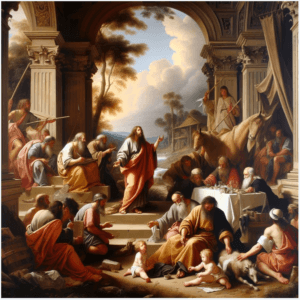 Among pastoral tribes the matrimonial arrangements are made by the parents, and a youth must marry, not among strangers, but in his own tribe – custom giving him a claim, which is seldom or never resisted, to the hand of his first cousin.
Among pastoral tribes the matrimonial arrangements are made by the parents, and a youth must marry, not among strangers, but in his own tribe – custom giving him a claim, which is seldom or never resisted, to the hand of his first cousin.
But Abraham had a far higher motive – a fear lest, if his son married into a Canaanitish family, he might be gradually led away from the true God.
Abraham is asking his most trusted servant to take a sacred oath to complete a crucial assignment, finding a wife for his son Isaac.
Many interpreters assume this servant is Eliezer, the servant mentioned decades earlier as the possible heir of Abraham’s estate (Genesis 15:2). However, this particular passage never specifies exactly who this man is.
Abraham begins by asking the man to place his hand under Abraham’s thigh. This would have involved the ancient Middle Eastern custom of swearing an oath to a man while touching his genitals as a sign of the importance of the commitment.
Strange as that may sound to modern culture, this was a gesture of profound symbolism. It implied that the one swearing the oath would answer to the other man’s seed—his offspring—if the oath was not kept.
Abraham, however, also insists that his servant also swear by the Lord, the God of heaven and earth, binding him to answer to God if he failed to do as promised.
Abraham, apparently concerned that he might die before Isaac could be married, asks his servant to swear not to let Isaac marry a local, Canaanite woman.
In the following verse, he will add that Isaac must marry a woman from Abraham’s former homeland and extended family. Further, though, Abraham will insist that Isaac not be allowed to leave Canaan to search for this bride (Genesis 24:5–8).
Genesis 24:4 KJV
But thou shalt go unto my country, and to my kindred, and take a wife unto my son Isaac.
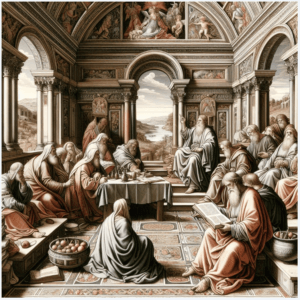 In the previous verse, Abraham asked his most trusted servant to swear an oath. This promise was to not allow his son Isaac to take a wife from among the local, Canaanite women.
In the previous verse, Abraham asked his most trusted servant to swear an oath. This promise was to not allow his son Isaac to take a wife from among the local, Canaanite women.
Apparently afraid that he might die before Isaac could be married, Abraham further asks his servant to swear to find a wife for Isaac among the women of Abraham’s old homeland and extended family.
Why is Abraham so urgent about this request?
He is aware of God’s promise to make from him a great people who will belong to the Lord. This promise from God was also to give Abraham’s offspring the land of Canaan, as their own possession.
He apparently does not want Isaac to marry a Canaanite woman and to begin to assimilate into the Canaanite people as one of them.
He is concerned, even in this first generation, that God’s people maintain a separate and distinct identity from the people of the land of Canaan.
Later, the Israelites will be officially commanded by God not to intermarry with the people of the land of Canaan (Deuteronomy 7:1–4).
Then, as now, the issue has nothing to do with race. Rather, the concern is over faith—avoiding the particularly wicked practices of the Canaanite people.
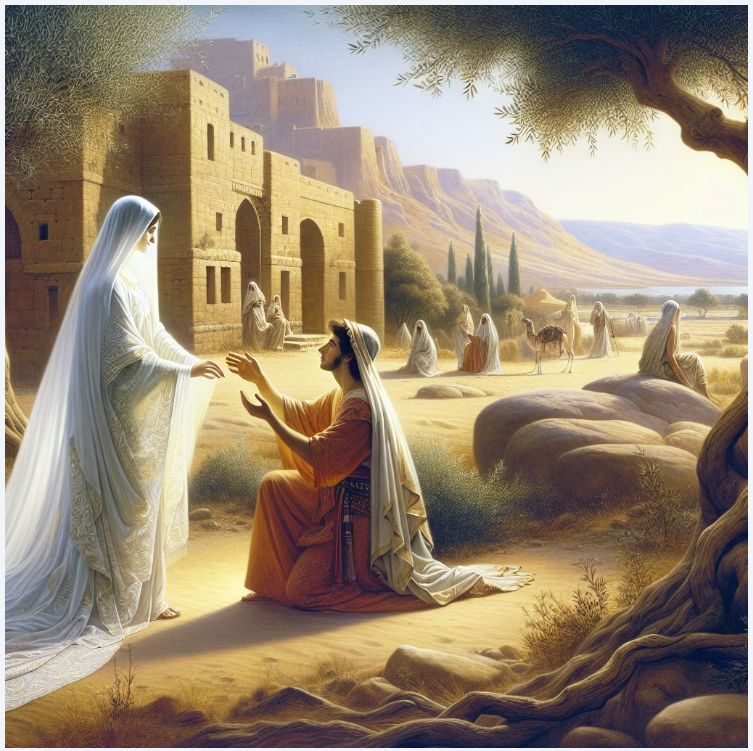
A Bride For Isaac – part 2
The servant receives a caveat: If he cannot find a woman willing to return to Canaan to marry Isaac, the servant will be released from his oath.
Abraham, though, is confident God will make this happen, even sending an angel to guarantee success (Genesis 24:5–9).
Genesis 24:5-9 KJV
[5] And the servant said unto him, Peradventure the woman will not be willing to follow me unto this land: must I needs bring thy son again unto the land from whence thou camest?
[6] And Abraham said unto him, Beware thou that thou bring not my son thither again.
[7] The LORD God of heaven, which took me from my father’s house, and from the land of my kindred, and which spake unto me, and that sware unto me, saying, Unto thy seed will I give this land; he shall send his angel before thee, and thou shalt take a wife unto my son from thence.
[8] And if the woman will not be willing to follow thee, then thou shalt be clear from this my oath: only bring not my son thither again.
[9] And the servant put his hand under the thigh of Abraham his master, and sware to him concerning that matter.
Genesis 24:5 KJV
And the servant said unto him, Peradventure the woman will not be willing to follow me unto this land: must I needs bring thy son again unto the land from whence thou camest?
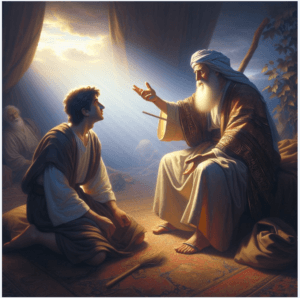 Abraham has asked his most trusted servant to swear to find a wife for his son Isaac. This man is explicitly charged with finding a woman of Abraham’s extended family, in his old homeland outside of Canaan.
Abraham has asked his most trusted servant to swear to find a wife for his son Isaac. This man is explicitly charged with finding a woman of Abraham’s extended family, in his old homeland outside of Canaan.
Before swearing to do so, however, the servant responds with a reasonable objection:
What if I find a girl, but she doesn’t want to travel away from her family to a strange land to marry a man she’s never seen?
Should I then take Isaac back to your people to live among them?
The servant’s question is very reasonable. He needs to know if marrying a girl from Abraham’s people is so critical that Isaac should be taken to live in Abraham’s former old homeland, if no woman will agree to come to Canaan.
Abraham’s response will fully resolve that question—his absolutely forbids the servant to allow Isaac to return to Mesopotamia. Abraham does not want to jeopardize, in any way, his descendants’ possession of the Promised Land.
Genesis 24:6 KJV
And Abraham said unto him, Beware thou that thou bring not my son thither again.
 Abraham has asked his servant to swear to find a wife for his son Isaac among his extended family back in his old homeland. The servant has asked what to do if a woman cannot be found who is willing to live in Canaan.
Abraham has asked his servant to swear to find a wife for his son Isaac among his extended family back in his old homeland. The servant has asked what to do if a woman cannot be found who is willing to live in Canaan.
Should Isaac move to Abraham’s old homeland to live in order to be married to one of the women of his extended family?
That’s a reasonable question, since Abraham is so absolutely set on Isaac marrying a woman from that region. Here Abraham makes his position clear: in no uncertain terms, Isaac cannot be allowed to go to Mesopotamia.
In fact, Abraham instructs the servant not to take Isaac back to that land. Isaac’s place is in the Promised Land of Canaan. This is the home of Abraham’s future offspring—period.
Isaac must not be allowed to leave and, by implication, risk settling outside of Canaan among Abraham’s extended family. Abraham has established why this mission is so critical.
Isaac must not marry into a Canaanite family and thus be assimilated into the Canaanite people. This is a spiritual issue, not a racial one: Abraham does not want to risk the identity of Abraham’s descendants as God’s chosen ones.
But Isaac also must not return to Abraham’s people and settle outside of the land of promise, which would also risk the family’s loss of identity as those who belong to God.
Only one path would work: Isaac must marry a woman from Abraham’s people and also live in the land of promise as a people living among, but separate from, the Canaanites.
Genesis 24:7 KJV
The LORD God of heaven, which took me from my father’s house, and from the land of my kindred, and which spake unto me, and that sware unto me, saying, Unto thy seed will I give this land; he shall send his angel before thee, and thou shalt take a wife unto my son from thence.
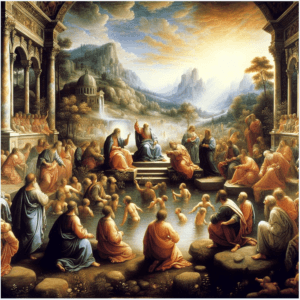 Abraham is answering his servant’s very valid question: what to do if he could not find a woman willing to move away from her family and live in the land of Canaan as Isaac’s wife? Abraham insists that God will make it happen.
Abraham is answering his servant’s very valid question: what to do if he could not find a woman willing to move away from her family and live in the land of Canaan as Isaac’s wife? Abraham insists that God will make it happen.
More specifically, he is sure an angel of the Lord will intervene in such a way as to bring it to pass.
Where did Abraham’s confidence that God would work in this way come from?
He remembered that the Lord did the exact same thing in his own life. He came to Abraham in the land of his own people and took him from his father’s house and promised to give the land of Canaan to his offspring (Genesis 12:1–7).
If God did that in Abraham’s life, the Lord would also do that in the life of this woman Isaac was meant to marry. Abraham’s confidence in God’s ability to move people where He wanted them was based on the experience of God acting in his own life.
We, too, can have confidence in God’s ability to work in the circumstances of others as He has worked in ours.
Genesis 24:8 KJV
And if the woman will not be willing to follow thee, then thou shalt be clear from this my oath: only bring not my son thither again.
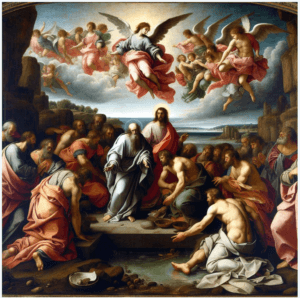 In the previous verse, Abraham expressed confidence that God would make a crucial mission successful. The servant Abraham is sending is meant to find a wife for Abraham’s son, Isaac, among Abraham’s people in Mesopotamia.
In the previous verse, Abraham expressed confidence that God would make a crucial mission successful. The servant Abraham is sending is meant to find a wife for Abraham’s son, Isaac, among Abraham’s people in Mesopotamia.
An angel of the Lord would go before his servant to ensure that a suitable wife would be found for Isaac among Abraham’s people, a woman willing to move from her family and live in the land of Canaan.
Now, though, Abraham assures his servant that if he’s wrong, if the woman is not willing to return to Canaan, then the servant will be released from the oath. The most important thing is that his servant not take Isaac out of Canaan under any circumstances.
Did Abraham make this concession because he suddenly doubted God would provide?
Probably not. More likely is that Abraham wanted to reassure his servant. This would make it easier for the man to swear to take on this mission without himself having to be confident that God would supernaturally intervene.
Genesis 24:9 KJV
And the servant put his hand under the thigh of Abraham his master, and sware to him concerning that matter.
 Now watch the servant as he goes out to get a bride for Isaac. Abraham has ordered his servant to find a wife for Isaac, among Abraham’s kinsmen back in Mesopotamia. However, Isaac is not to leave Canaan—the woman must be brought here.
Now watch the servant as he goes out to get a bride for Isaac. Abraham has ordered his servant to find a wife for Isaac, among Abraham’s kinsmen back in Mesopotamia. However, Isaac is not to leave Canaan—the woman must be brought here.
The servant is concerned he might not be able to find a suitable woman and convince her to travel so far to marry Isaac. So, Abraham made it clear to his servant that this oath would not be binding if circumstances were beyond his control.
With that reassurance, as Abraham had requested, the servant would swear not to allow Isaac to marry any local Canaanite woman and would, instead, travel himself to the land of Abraham’s people to attempt to find a wife for Isaac who would agree to marry him and live in Canaan.
The servant put his hand under Abraham’s thigh, as was the custom, and took the oath. This symbolic gesture implied that the oath-taker would be at the mercy of Abraham’s descendants if he did not fulfill his end of the bargain.
The whole conversation raises an obvious question: Where was Isaac?
As a man around the age of 40 (Genesis 25:20), why did he not participate in this conversation?
Why was Abraham’s servant given so much authority over Isaac’s decisions instead of Isaac himself being included?
We’re never told. Perhaps custom demanded that finding a wife was absolutely a father’s duty and one Abraham could not fulfill without the help of his servant.
Perhaps Isaac was a particularly passive person. In any case, Abraham saw it as his responsibility to find his son a wife without, apparently, Isaac’s input.

A Bride For Isaac – part 3
The servant arrives in Mesopotamia at the town of Nahor, which shares the name of Abraham’s own brother.
Eager not to fail in his mission, the servant prays to Abraham’s God and asks that if any of the young women coming to draw water at the town well offer to water his ten camels, she will be the one God has appointed for Isaac (Genesis 24:10–14).
Genesis 24:10-14 KJV
[10] And the servant took ten camels of the camels of his master, and departed; for all the goods of his master were in his hand: and he arose, and went to Mesopotamia, unto the city of Nahor.
[11] And he made his camels to kneel down without the city by a well of water at the time of the evening, even the time that women go out to draw water.
[12] And he said, O LORD God of my master Abraham, I pray thee, send me good speed this day, and shew kindness unto my master Abraham.
[13] Behold, I stand here by the well of water; and the daughters of the men of the city come out to draw water:
[14] And let it come to pass, that the damsel to whom I shall say, Let down thy pitcher, I pray thee, that I may drink; and she shall say, Drink, and I will give thy camels drink also: let the same be she that thou hast appointed for thy servant Isaac; and thereby shall I know that thou hast shewed kindness unto my master.
Genesis 24:10 KJV
And the servant took ten camels of the camels of his master, and departed; for all the goods of his master were in his hand: and he arose, and went to Mesopotamia, unto the city of Nahor.
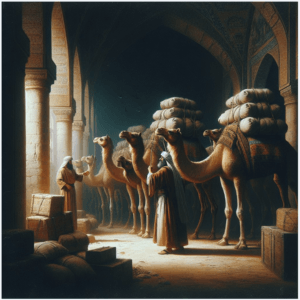 The servant who is going to Mesopotamia to get a bride for Isaac takes ten camels along, and that means somebody had to ride them. He took along quite a retinue of servants. “For all the goods of his master were in his hand.”
The servant who is going to Mesopotamia to get a bride for Isaac takes ten camels along, and that means somebody had to ride them. He took along quite a retinue of servants. “For all the goods of his master were in his hand.”
In other words, he had charge of all the chattels and all the possessions of Abraham.
So great an equipage was to give the embassy an appearance worthy of the rank and wealth of Abraham; to carry provisions; to bear the marriage presents, which as usual would be distributed over several beasts; besides one or two spare camels in case of emergency.
A stranger in those regions, who wishes to obtain information, stations himself at one of the wells in the neighborhood of a town, and he is sure to learn all the news of the place from the women who frequent them every morning and evening.
Eliezer followed this course, and letting his camels rest, he waited till the evening time of water drawing. Abraham’s servant has accepted his mission and sworn his oath.
He will do all he can to find a wife for Isaac among Abraham’s people in northwest Mesopotamia, also known as Aram Naharaim. To that end, he takes with him a demonstration of Abraham’s great wealth, beginning with ten camels.
In that era of the Middle East, apparently, camels, were not yet common. To bring ten of these rare, useful animals would communicate great riches to the family of any perspective wives.
In addition, the servant packed a variety of expensive gifts to present to a potential bride and her family. Custom demanded that a suitor give gifts to the bride’s family. Abraham’s servant would make sure not to fail in his quest due to a lack of generosity.
Sufficiently equipped, the servant soon arrived at his destination in the city of Nahor. Nahor was the name of Abraham’s brother (Genesis 11:27), making this a good place to start looking for a bride among Abraham’s kinsmen.
Genesis 24:11 KJV
And he made his camels to kneel down without the city by a well of water at the time of the evening, even the time that women go out to draw water.
 It may seem strange to you that the women came out to draw water, but they were the ones who did the watering of the camels in that day. Very frankly, women did lots more work in those days than they do today—I mean by that, hard physical labor.
It may seem strange to you that the women came out to draw water, but they were the ones who did the watering of the camels in that day. Very frankly, women did lots more work in those days than they do today—I mean by that, hard physical labor.
The women were the ones who watered and took care of the stock. The men were supposed to be out trading and doing other work—they were not always loafing, by any means.
But it is interesting to note that it was the custom of that day for women to go out to draw water. This servant was waiting because it was not the proper thing for him, as a stranger, to water his camels before the others who lived in that community.
This servant is depending upon God. Abraham had put all of this in the hands of the Lord, and now the servant does also: Abraham’s servant is on a mission to find a wife for Abraham’s son, Isaac.
He has been sent to find the family which Abraham left behind in Mesopotamia. The servant is not named, though some believe this is Eliezer, mentioned earlier as Abraham’s prospective heir (Genesis 15:2).
Having arrived at his destination in the evening, Abraham’s servant needed to water the camels. He makes them kneel down by the town well outside the city. It was the time women would typically come to the well to draw water for their families.
Abraham’s servant is likely tired from his journey, but he has a specific plan in mind to find the right woman for his master’s son (Genesis 24:12).
Genesis 24:12 KJV
And he said, O LORD God of my master Abraham, I pray thee, send me good speed this day, and shew kindness unto my master Abraham.
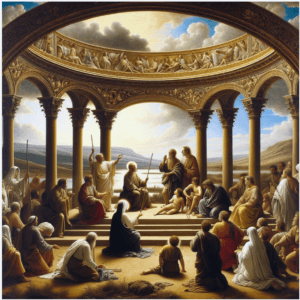 Abraham’s servant has arrived at his destination. His mission is to find a wife for Abraham’s son, Isaac, from among Abraham’s extended family back in Mesopotamia (Genesis 24:3–4).
Abraham’s servant has arrived at his destination. His mission is to find a wife for Abraham’s son, Isaac, from among Abraham’s extended family back in Mesopotamia (Genesis 24:3–4).
The city of Nahor, named after one of these relatives, is a likely spot to begin searching. The servant has made his ten camels kneel down by the well outside the city. These animals, themselves, would have been a sign of great wealth and power.
At this time in the Middle East, it seems, camels were not yet commonly used. This servant has also brought lavish gifts to give to a prospective bride. Those material goods are not his only plan, however.
Now, he prays to God. More specifically, the servant prays to Abraham’s God for Abraham’s sake. He asks Abraham’s God to give him success in this mission of Abraham’s. And He asks that God would, in doing so, show His steadfast love to Abraham.
Has there ever been a more servant-minded servant?
Not only is he doing what his master has asked, he is doing it with the prayer that his master’s God would show love to his master.
This prayer of faith still stands a model of selflessness and servanthood 4,000 years later. This is especially poignant, if this servant is, in fact, the man Abraham named as his potential heir many decades ago (Genesis 15:2).
In this particular passage, the servant is not named, but it’s possible that this is the very same man. The servant appears worthy of the master he served.
He resolves to follow the leading of Providence; and while he shows good sense in the tokens he fixes upon of ascertaining the temper and character of the future bride, he never doubts but that in such a case God will direct him.
The servant’s prayer is something like this: “The daughters of the men of the city will be coming out. I do not know which one to choose, and it is just left up to me to pick one of them.
I pray that the one that I pick might be the one that You pick.” In other words, he calls upon the Lord to lead him in making the right choice.
Genesis 24:13 KJV
Behold, I stand here by the well of water; and the daughters of the men of the city come out to draw water:
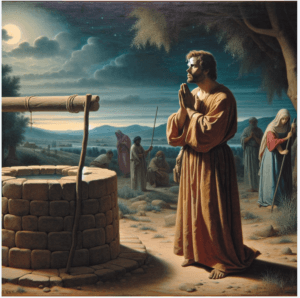 Who do you think he is going to pick?
Who do you think he is going to pick?
Well, he is a man, and he is going to pick the best looking woman who comes out. And you can be sure of one thing—Rebekah was a good looking woman. The Puritans had the idea that beauty was of the devil.
The devil is beautiful—he’s an angel of light, by the way—but he does not have it all. After all, God is the Creator, and you have never seen a sunset or looked at a beautiful flower that He did not make.
He makes women beautiful, and there is nothing wrong with that. Abraham’s servant continues to pray to the “God of my master Abraham,” asking for success in his mission to find his master’s son a wife.
Abraham has sent him to find a wife for Isaac, specifically from Abraham’s extended family back in Mesopotamia (Genesis 24:3–4). Now the servant becomes very specific in this request.
He describes where he is sitting by the spring, the well, outside the city of Nahor. This was named for one of Abraham’s relatives, making it a good place to start the search (Genesis 11:27).
The servant describes to God how the daughters of the men of the city are coming out to draw water. In the following verse, he will ask God to give him a specific sign about which of these young women will be Isaac’s wife.
Genesis 24:14 KJV
And let it come to pass, that the damsel to whom I shall say, Let down thy pitcher, I pray thee, that I may drink; and she shall say, Drink, and I will give thy camels drink also: let the same be she that thou hast appointed for thy servant Isaac; and thereby shall I know that thou hast shewed kindness unto my master.
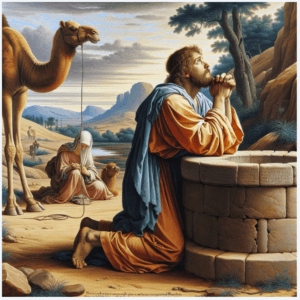 I am sure this man is going to pick the best looking one who comes out—he’d be a pretty poor servant if he didn’t. Abraham’s servant continues to pray to the “God of my master Abraham,” asking for success in his mission to find his master’s son a wife.
I am sure this man is going to pick the best looking one who comes out—he’d be a pretty poor servant if he didn’t. Abraham’s servant continues to pray to the “God of my master Abraham,” asking for success in his mission to find his master’s son a wife.
He has been sent to find a woman from Abraham’s extended family in Mesopotamia (Genesis 24:3–4). The city of Nahor, named after one of Abraham’s relatives, is a good place to start (Genesis 11:27). His prayer reflects a desire to see Abraham’s wish fulfilled.
Now, the servant becomes specific in this request. He wants God, in essence, to allow one of these young women to be the one God has chosen for Isaac. He also wants a sign from God about which one it is.
The servant’s plan is this: He will ask the young women to draw some water for him to drink. The one God has chosen will be the one who says, “Drink, and I will water your camels also.”
What this young woman would be offering in watering the camels would not be a small task. Abraham’s servant had ten thirsty camels with him. That will require drawing a lot of heavy water.
In addition to seeking a divine confirmation from God about which girl is the right one, it’s likely the servant also intends this as a test of the girl’s generosity and servanthood.
Anyone willing to serve in this way without being asked would be demonstrating good and generous character. The servant is not merely looking for the prettiest or the most eager young woman; he is sincerely seeking a woman of depth and virtue.
The servant concludes his prayer by saying that when the Lord does this for him, he will know that God has shown steadfast love to his master. God’s answer to the prayer will be a sign of God’s love.

A Bride For Isaac – part 4
Before the servant has finished his prayer, Rebekah enters the scene and does exactly as the servant has asked. He immediately gives expensive jewelry to Rebekah.
He asks if her family has room to accommodate a visit from himself and his company, including their camels. He also asks who her father is (Genesis 24:15–23).
Genesis 24:15-23 KJV
[15] And it came to pass, before he had done speaking, that, behold, Rebekah came out, who was born to Bethuel, son of Milcah, the wife of Nahor, Abraham’s brother, with her pitcher upon her shoulder.
[16] And the damsel was very fair to look upon, a virgin, neither had any man known her: and she went down to the well, and filled her pitcher, and came up.
[17] And the servant ran to meet her, and said, Let me, I pray thee, drink a little water of thy pitcher.
[18] And she said, Drink, my lord: and she hasted, and let down her pitcher upon her hand, and gave him drink.
[19] And when she had done giving him drink, she said, I will draw water for thy camels also, until they have done drinking.
[20] And she hasted, and emptied her pitcher into the trough, and ran again unto the well to draw water, and drew for all his camels.
[21] And the man wondering at her held his peace, to wit whether the LORD had made his journey prosperous or not.
[22] And it came to pass, as the camels had done drinking, that the man took a golden earring of half a shekel weight, and two bracelets for her hands of ten shekels weight of gold;
[23] And said, Whose daughter art thou? tell me, I pray thee: is there room in thy father’s house for us to lodge in?
Genesis 24:15 KJV
And it came to pass, before he had done speaking, that, behold, Rebekah came out, who was born to Bethuel, son of Milcah, the wife of Nahor, Abraham’s brother, with her pitcher upon her shoulder.
 As he anticipated, a young woman unveiled, as in pastoral regions, appeared with her pitcher on her shoulder. Abraham’s unnamed servant is on a mission to find a wife for Abraham’s son, Isaac.
As he anticipated, a young woman unveiled, as in pastoral regions, appeared with her pitcher on her shoulder. Abraham’s unnamed servant is on a mission to find a wife for Abraham’s son, Isaac.
He has been sent specifically to Abraham’s extended family in Mesopotamia. His first stop is at a town named for one of Abraham’s relatives. There, he prays for God to give him a sign about which woman he should bring home for Isaac.
Specifically, he is seeking a woman with a generous spirit. His prayer involves asking for water, and seeing if a woman volunteers to also bring water for his camels—not a small task.
Even before Abraham’s servant has concluded the prayer described in the previous verses (Genesis 24:12–14), Rebekah walks into view carrying a water jar on her shoulder.
God immediately responded to the servant’s sincere prayer to show love to Abraham by showing the servant the appointed girl. Rebekah is the granddaughter of Nahor, Abraham’s brother (Genesis 11:27).
Her father Bethuel was born to Nahor’s wife Milcah (Genesis 22:20–23). The servant did not yet know all of that, but this means that not only will Isaac’s wife be from among Abraham’s clan, she will be of his more immediate family.
Genesis 24:16 KJV
And the damsel was very fair to look upon, a virgin, neither had any man known her: and she went down to the well, and filled her pitcher, and came up.
 Abraham’s servant has been praying that God will give him a sign. This sign is meant to confirm that he has found the right woman to marry Isaac, Abraham’s son.
Abraham’s servant has been praying that God will give him a sign. This sign is meant to confirm that he has found the right woman to marry Isaac, Abraham’s son.
The servant has asked God to show him the woman he should approach, based on her generosity and kindness (Genesis 24:12–14).
The previous verses revealed that Rebekah walked into view even before Abraham’s servant finished asking God to give success to his mission.
The servant does not yet know that this girl is the granddaughter of Abraham’s own brother (Genesis 22:20–23), but he does see that she is very attractive.
While this is a wonderful thing, it’s important to note that the servant’s prayer made no mention of appearances. He is seeking a woman of character, first and foremost, and her beauty will turn out to be an additional blessing.
He watches as she goes down to the spring, meaning the well, fills her water jar, and starts to head back into the town. He decides he must talk to her.
I told you Rebekah was good looking—I knew it was coming, of course. She was good looking—the Word of God says it, my friend, and there is nothing wrong with that. I resent it today that Hollywood, the theater, and the devil get beauty.
I think that the Lord ought to have some of it. He made it to begin with, and there is nothing wrong with His using a lovely and beautiful person. I pray always that God will call fine looking men and women into His service today.
“And the damsel was very fair to look upon.” She was not just an ordinary girl. She would have won a beauty contest. She was “a virgin, neither had any man known her.”
Genesis 24:17 KJV
And the servant ran to meet her, and said, Let me, I pray thee, drink a little water of thy pitcher.
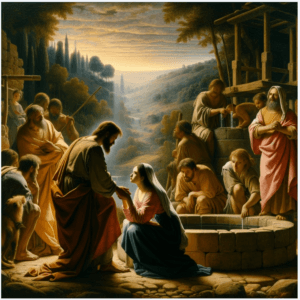 Abraham’s servant, resting by the well outside the city of Nahor, watches Rebekah fill her water jar and begin to return to the city.
Abraham’s servant, resting by the well outside the city of Nahor, watches Rebekah fill her water jar and begin to return to the city.
He has been sent to find a wife for Abraham’s son, Isaac, and recently began praying for God to send the right woman to the well (Genesis 24:3–4; 12–14).
Before he has even finished this prayer—asking God to show him a woman who is kind and generous—Rebekah appears. Now he approaches her, seeking to put into effect his plan to find the girl God has appointed for Isaac.
In the previous verses, the servant’s prayer was that the appointed woman would respond to his request for water by offering to water his ten camels, as well. So the servant asks for a drink, and Rebekah’s response is found in the following verses.
As it turns out, this woman is not only beautiful (Genesis 24:16), she is also hospitable (Genesis 24:18). This is the very one God has intended for Isaac.
Genesis 24:18 KJV
And she said, Drink, my lord: and she hasted, and let down her pitcher upon her hand, and gave him drink.
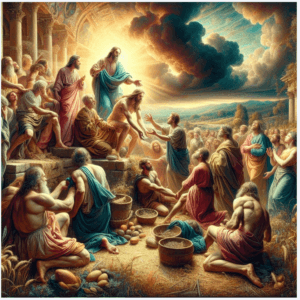 In the previous verse, Abraham’s servant approached Rebekah, asking for a drink of water. His plan, according to his prayer to God, is that one of the women at this well will respond to this request by offering to also bring water for the servant’s ten camels (Genesis 24:12–14).
In the previous verse, Abraham’s servant approached Rebekah, asking for a drink of water. His plan, according to his prayer to God, is that one of the women at this well will respond to this request by offering to also bring water for the servant’s ten camels (Genesis 24:12–14).
This is no small task, so such a favor would suggest a woman of high character. The servant intends to pursue the woman this test signifies; she is, presumably, the one God intends to be brought bring back as a wife for Isaac, son Abraham.
Before the servant had even completed his prayer, an attractive woman appears, and he decides to put into effect his plan to find the girl God has appointed for Isaac. So the servant asked her for some water to drink.
Here, she responds by “quickly” giving him a drink from her jar. The emphasis on her immediate reaction is meant to show Rebekah’s generosity.
Genesis 24:19 KJV
And when she had done giving him drink, she said, I will draw water for thy camels also, until they have done drinking.
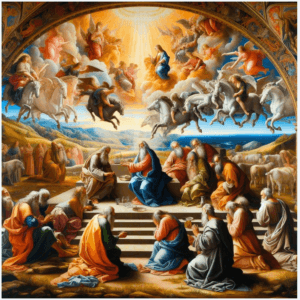 This is the moment Abraham’s servant has been waiting for. Though, to be honest, he hasn’t been waiting long.
This is the moment Abraham’s servant has been waiting for. Though, to be honest, he hasn’t been waiting long.
He had asked God that the girl destined to marry his master’s son, Isaac, would respond to his request for water by offering to water his ten camels, as well (Genesis 24:12–14).
Before he has even finished this prayer, an attractive young woman appeared at the well: Rebekah. So, the servant decides to begin immediately and ask the woman for water.
She quickly complies, while Abraham’s servant waits to see if she offers to water the camels. Now Rebekah does exactly that! Without being asked, she offers to draw water for his camels until they have finished drinking.
With one water jar and ten thirsty camels, that is no small task. It could take a while. By God’s grace, the servant has found God’s bride for his master’s son almost immediately after arriving at his destination.
Rebekah doesn’t know that, yet, of course. And the mission is not yet complete. The servant still has work to do, convincing Rebekah and her family to accept a marriage proposal and a long journey.
The important thing to note is that Rebekah is a very polite and courteous girl also. She is beautiful, not dumb, and very polite.
Genesis 24:20 KJV
And she hasted, and emptied her pitcher into the trough, and ran again unto the well to draw water, and drew for all his camels.
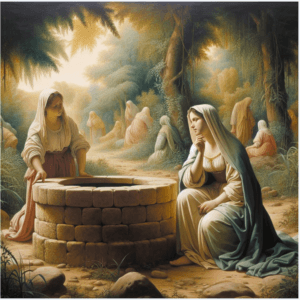 Her comely appearance, her affable manners, her obliging courtesy in going down the steps to fetch water not only to him but to pour it into the trough for his camels, afforded him the most agreeable surprise.
Her comely appearance, her affable manners, her obliging courtesy in going down the steps to fetch water not only to him but to pour it into the trough for his camels, afforded him the most agreeable surprise.
Abraham’s servant had asked God that the girl meant to marry Isaac would offer to water his camels without being prompted (Genesis 24:12–14). In the previous verse, Rebekah did exactly that.
Now she follows through on her offer to keep bringing water to the trough for the camels until they are finished drinking. She acts quickly and thoroughly. This is likely well beyond what Abraham’s servant would have hoped for.
Not only has God given the sign that the right girl has been found, she is demonstrating a generous spirit, a sense of hospitality, and a genuine work ethic. The emphasis on Rebekah acting “quickly” seems to confirm that this is unprompted behavior.
She’s sincerely acting out of good will, not being coerced or manipulated with guilt. This is a key feature in how Abraham’s servant has approached his task to find a wife for Isaac (Genesis 24:3–4).
His prayer specifically asked God to send a woman of character. Rebekah’s beauty (Genesis 24:16) is certainly a good thing, but it’s not the primary trait this man is looking for.
Remember that there were ten camels, and I do not know how long it had been since they had last filled their tanks. It was just like filling the radiator of a car to fill up those camels.
Genesis 24:21 KJV
And the man wondering at her held his peace, to wit whether the LORD had made his journey prosperous or not.
 She was the very person his imagination had pictured, and he proceeded to reward her civility. Abraham’s servant has come to a city in Mesopotamia named after one of Abraham’s relatives (Genesis 22:20–23).
She was the very person his imagination had pictured, and he proceeded to reward her civility. Abraham’s servant has come to a city in Mesopotamia named after one of Abraham’s relatives (Genesis 22:20–23).
His quest is to find a suitable wife for Abraham’s son, Isaac (Genesis 24:3–4). To fulfill this request, the servant prayed that God would send a woman with a generous spirit.
This would be shown if the servant asked for water, and a woman responded by offering to also bring water for his ten camels (Genesis 24:12–14). As shown in this verse, God has answered the servant’s request so quickly that he is left speechless.
Or perhaps he is resisting the urge to decide too hastily that a wife has been found for his master’s son. The fact that Rebekah arrived before he has even finished his prayer (Genesis 24:15) seems too good to be true.
The servant is clearly loyal to Abraham, and he wants to be sure this is actually the right woman for his master’s son.
Had the Lord truly granted success in this quest so quickly?
Is this really the girl God means for Isaac to marry?
Abraham’s servant ponders this while Rebekah completes the lengthy process of carrying water, one jar at a time, to a trough until ten thirsty camels have had their fill.
The servant just stands there in amazement. He is wondering whether this is it, whether God is leading or not—he believes He is.
Genesis 24:22 KJV
And it came to pass, as the camels had done drinking, that the man took a golden earring of half a shekel weight, and two bracelets for her hands of ten shekels weight of gold;
 The ring was not for the ear, but the nose; the armlets, such as young women in Syria and Arabia still appear daily at wells decked in. They are worn from the elbow to the wrist, commonly made of silver, copper, brass, or horn.
The ring was not for the ear, but the nose; the armlets, such as young women in Syria and Arabia still appear daily at wells decked in. They are worn from the elbow to the wrist, commonly made of silver, copper, brass, or horn.
Abraham’s servant prayed for a sign from God to help him complete his mission to find Abraham’s son, Isaac, a wife (Genesis 24:3–4).
Before that prayer had even been completed, Rebekah appeared and fulfilled the exact request made by the servant (Genesis 24:12–19).
Apparently convinced that God has led him to Rebekah as a potential bride for Isaac, Abraham’s servant takes the next steps in making the proposal, to secure her as a wife for his master’s son.
He starts by giving her very generous gifts of a gold ring and two bracelets. The weight of these items communicates their value. A half-shekel, also referred to as a beka, was about 1/5 ounces.
These gifts, weighing more than 4 ounces, would have been worth thousands of dollars, in their modern equivalent. Rebekah may have assumed that the servant was repaying her act of generosity in watering his camels.
She doesn’t know that he is beginning negotiations for her hand in marriage by the giving of gifts and demonstrating just how wealthy his master is.
Genesis 24:23 KJV
And said, Whose daughter art thou? tell me, I pray thee: is there room in thy father’s house for us to lodge in?
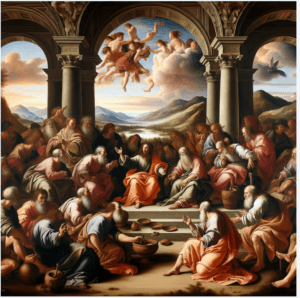 After telling her name and family, the kind-hearted damsel hastened home to give notice of a stranger‘s arrival. Abraham’s servant has prayed that God would send a sign regarding the right woman to marry his master’s son, Isaac (Genesis 24:12–14).
After telling her name and family, the kind-hearted damsel hastened home to give notice of a stranger‘s arrival. Abraham’s servant has prayed that God would send a sign regarding the right woman to marry his master’s son, Isaac (Genesis 24:12–14).
The young woman who appeared before he had even finished this prayer (Genesis 24:15) immediately fulfilled this sign (Genesis 24:19).
Abraham’s servant then begins the marriage proposal process, by giving Rebekah very generous gifts of a gold ring and bracelets.
These would have been worth thousands of dollars in modern times, so his gift is not only lavish, it would certainly have gotten Rebekah’s attention.
The servant now asks if there might be room for him and his company to stay in her father’s house for the night. After she has received his gifts, perhaps he hopes she will be more willing to extend further hospitality.
The servant also asks who her father is. Her answer in the following verse will further confirm for him that the Lord has indeed arranged this encounter with Rebekah.
His mission from Abraham was to find a wife from among Abraham’s extended family in Mesopotamia (Genesis 24:3–4). Her answer confirms that God has, indeed, sent the right bride for Isaac.

A Bride For Isaac – part 5
When Rebekah names her father, the servant knows exactly who she is. She is the granddaughter of Abraham’s own brother Nahor. This is better even than the servant had hoped. He knows now that the Lord has led him to the exact young lady intended for Isaac.
As Abraham has requested, he has found Abraham’s kinsmen and identified a bride for Isaac. He immediately worships the Lord right in front of Rebekah (Genesis 24:24–27).
Genesis 24:24-27 KJV
[24] And she said unto him, I am the daughter of Bethuel the son of Milcah, which she bare unto Nahor.
[25] She said moreover unto him, We have both straw and provender enough, and room to lodge in.
[26] And the man bowed down his head, and worshipped the LORD.
[27] And he said, Blessed be the LORD God of my master Abraham, who hath not left destitute my master of his mercy and his truth: I being in the way, the LORD led me to the house of my master’s brethren.
Genesis 24:24 KJV
And she said unto him, I am the daughter of Bethuel the son of Milcah, which she bare unto Nahor.
 Nahor is a brother of Abraham. A servant sent by Abraham has spoken with Rebekah at a well in Mesopotamia. This encounter came after the servant was commanded by Abraham to find a wife suitable for Isaac, his son, among Abraham’s extended family.
Nahor is a brother of Abraham. A servant sent by Abraham has spoken with Rebekah at a well in Mesopotamia. This encounter came after the servant was commanded by Abraham to find a wife suitable for Isaac, his son, among Abraham’s extended family.
The servant’s prayer for a sign (Genesis 24:12–14) was answered immediately (Genesis 24:15–19). And so, he offered lavish gifts to Rebekah in order to begin the process of convincing her to come back to Canaan, in order to marry Isaac.
First, though, the servant wants to be sure that this woman is actually part of the family Abraham has asked him to contact.
As we will see in the following verses, Rebekah’s answer to the question about who her father is provides a great surprise and delight for Abraham’s servant.
More, it is even further confirmation that God has arranged the whole encounter. The Lord has led the servant directly to the girl he intends for Isaac to marry. Rebekah replies that her father is Bethuel, the son of Nahor and Milcah.
The servant apparently knew his master’s history well since he recognized these names. Nahor was Abraham’s brother. Milcah was the daughter of another brother.
Abraham had received word of the birth of Bethuel and Nahor’s other children, as recorded in Genesis 22:20–24.
Genesis 24:25 KJV
She said moreover unto him, We have both straw and provender enough, and room to lodge in.
 Abraham’s servant has already seen a sign from God, in response to his prayer. After being sent to find a wife for Abraham’s son, Isaac, among Abraham’s family in Mesopotamia, the servant prays.
Abraham’s servant has already seen a sign from God, in response to his prayer. After being sent to find a wife for Abraham’s son, Isaac, among Abraham’s family in Mesopotamia, the servant prays.
In response to this prayer, Rebekah appears and fulfills the sign (Genesis 24:12–19). The servant then gives her lavish gifts, and asks about her family and possibly staying overnight with her father (Genesis 24:22–24).
Her answer delights the servant—she is, indeed, part of the family Abraham wanted this man to contact.
In addition to her unknowing revelation that she is the granddaughter of Abraham’s own brother, generous Rebekah adds that her family does indeed have room for this traveling stranger to spend the night.
She even thinks of the camels, mentioning they have both straw and fodder enough to accommodate the beasts. Given the room for both men and animals, Rebekah’s family apparently has some amount of wealth.
She stops short of offering to allow the company to stay with them. As a young women in her father’s household, that would not be her role.
Rather, Rebekah’s answer indicates that her family can accommodate the servant and his entourage, not that they necessarily will.
Genesis 24:26 KJV
And the man bowed down his head, and worshipped the LORD.
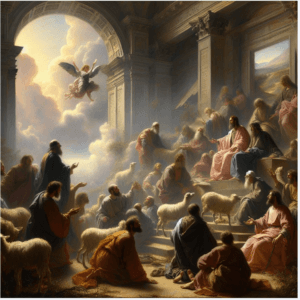 The servant sees the hand of God in this. It is wonderful to have God leading and guiding, is it not?
The servant sees the hand of God in this. It is wonderful to have God leading and guiding, is it not?
Abraham’s unnamed servant demonstrates more faith and faithfulness to the Lord than many other men and women in Scripture who had direct contact with God.
Not only does the servant pray for God to give success to his mission, he recognizes that God has done exactly as he asked. Before moving on, he stops right in the middle of this conversation with Rebekah and worships the Lord.
Most of us realize how uncharacteristic this is even among the people of God. We may be humble enough to ask for help, for success in our efforts, to overcome an obstacle.
We are much less likely to be quick to give God credit when He grants our request and to stop long enough to worship Him in response to His kindness to us.
Genesis 24:27 KJV
And he said, Blessed be the LORD God of my master Abraham, who hath not left destitute my master of his mercy and his truth: I being in the way, the LORD led me to the house of my master’s brethren.
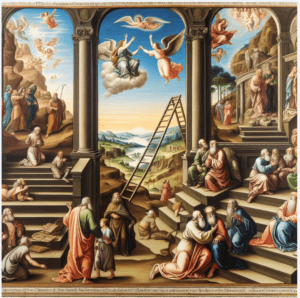 When Rebekah reveals that her grandfather is Abraham’s brother Nahor, the servant recognizes that God has indeed answered his prayers and brought him right to the doorstep of Isaac’s future wife.
When Rebekah reveals that her grandfather is Abraham’s brother Nahor, the servant recognizes that God has indeed answered his prayers and brought him right to the doorstep of Isaac’s future wife.
He stops in the middle of his conversation with Rebekah and worships the Lord. His prayer reveals his heart. First, the servant blesses the Lord, addressing him once more as the God of his master.
Next, he expresses his gratitude and relief that God still has steadfast love and faithfulness for his master. The servant was clearly concerned that if this mission failed, it would suggest that God was no longer concerned with Abraham.
Finally, the servant includes himself in the prayer, giving God the credit for leading him not only to some distant relation of Abraham’s, but to Abraham’s own immediate family relations.
One note: It was apparently common in this era and in Abraham’s family for close relatives to marry each other.
This early in human history, there was apparently little risk of genetic issues resulting from the offspring of family members, and God had not yet forbid Israel from marriages between close relatives.
In fact, it will become clear that God very much intended for Isaac to marry his cousin Rebekah for the purpose of creating a people that were uniquely His own.
This is a great statement here: “I being in the way, the LORD led me. . . .” The Lord leads those who are in the way—that is, those who are in His way, who are wanting to be led, who will be led of Him, and who will do what He wants done.
God can lead a willing heart anytime.

A Bride For Isaac – part 6
Rebekah hurries home and soon her brother rushes to the well to welcome this servant of their family member Abraham. Invited into the home of Rebekah’s father Bethuel, the servant presents his mission, telling in great detail how the Lord led him to Rebekah.
Genesis 24:28-39 KJV
[28] And the damsel ran, and told them of her mother’s house these things.
[29] And Rebekah had a brother, and his name was Laban: and Laban ran out unto the man, unto the well.
[30] And it came to pass, when he saw the earring and bracelets upon his sister’s hands, and when he heard the words of Rebekah his sister, saying, Thus spake the man unto me; that he came unto the man; and, behold, he stood by the camels at the well.
[31] And he said, Come in, thou blessed of the LORD; wherefore standest thou without? for I have prepared the house, and room for the camels.
[32] And the man came into the house: and he ungirded his camels, and gave straw and provender for the camels, and water to wash his feet, and the men’s feet that were with him.
[33] And there was set meat before him to eat: but he said, I will not eat, until I have told mine errand. And he said, Speak on.
[34] And he said, I am Abraham’s servant.
[35] And the LORD hath blessed my master greatly; and he is become great: and he hath given him flocks, and herds, and silver, and gold, and menservants, and maidservants, and camels, and asses.
[36] And Sarah my master’s wife bare a son to my master when she was old: and unto him hath he given all that he hath.
[37] And my master made me swear, saying, Thou shalt not take a wife to my son of the daughters of the Canaanites, in whose land I dwell:
[38] But thou shalt go unto my father’s house, and to my kindred, and take a wife unto my son.
[39] And I said unto my master, Peradventure the woman will not follow me.
Genesis 24:28 KJV
And the damsel ran, and told them of her mother’s house these things.
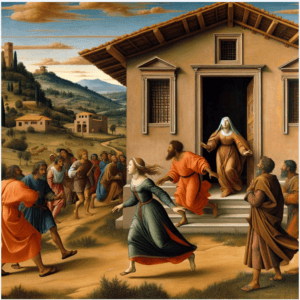 The female apartments. This family was in an advanced stage of pastoral life, dwelling in a settled place and a fixed habitation. This is turning out to be a momentous day for Rebekah.
The female apartments. This family was in an advanced stage of pastoral life, dwelling in a settled place and a fixed habitation. This is turning out to be a momentous day for Rebekah.
A servant sent by Abraham from the land of Canaan, has arrived at a well in her home city (Genesis 24:10–11). Unknown to Rebekah, this man is looking for a wife for Abraham’s son, Isaac (Genesis 24:3–4).
He was praying that God would send the right woman, just as Rebekah came into view (Genesis 24:12–15).
Seeing that she fulfilled a specific sign the man had asked for (Genesis 24:18–19), he approached her with gifts and asked if her family could take his traveling group in for the night (Genesis 24:22–25).
After telling this traveling stranger that her household was large enough to accommodate both him and his animals—and then learning from his prayer of gratitude that his master was closely related to her family—she ran home to tell her mother’s household all of this news.
The next question for Abraham’s servant will be how Rebekah’s family will react to a proposal of marriage to his master’s son in faraway Canaan.
Genesis 24:29 KJV
And Rebekah had a brother, and his name was Laban: and Laban ran out unto the man, unto the well.
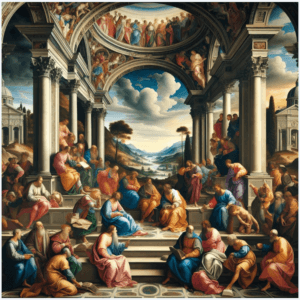 Right here, let me warn you to keep your eye on Uncle Laban. He will bear watching at this point and from here on. He was greatly impressed by material things.
Right here, let me warn you to keep your eye on Uncle Laban. He will bear watching at this point and from here on. He was greatly impressed by material things.
Notice what happens: From what we know of his character, there is reason to believe that the sight of the dazzling presents increased both his haste and his invitation. Rebekah has been speaking with a traveler from the land of Canaan.
This man is a servant of Abraham, on a mission to find a wife for Abraham’s son, Isaac (Genesis 24:3–4). Rebekah arrived as the man was praying for God to send him a sign (Genesis 24:12–14), and she unknowingly fulfilled that very request (Genesis 24:18–19).
The man gave her expensive gifts, and asked if her family was able to accommodate the traveling group for the night (Genesis 24:22–25). Suddenly a new character—and a complication—bursts onto the scene of this unfolding drama.
Rebekah had run home to tell the news about this stranger, his wealth, his connection to the family, and his interest in staying with them (Genesis 24:28). Now her brother Laban runs back to the spring, the well, where Abraham’s servant remains waiting.
As Rebekah’s brother, Laban will play a role in the decision of whether to accept the coming marriage proposal for Rebekah and to allow her to travel and settle away from the family.
He will also play a role later in Genesis when Jacob, the son of Rebekah and Isaac, comes to him looking for a wife of his own (Genesis 29).
The role of brothers, or fathers, in accepting marriage proposals, was common in that time; this was part of why Abraham had attempted to pretend that he was only Sarah’s brother in years past (Genesis 12:11–13; Genesis 20:2).
Genesis 24:30 KJV
And it came to pass, when he saw the earring and bracelets upon his sister’s hands, and when he heard the words of Rebekah his sister, saying, Thus spake the man unto me; that he came unto the man; and, behold, he stood by the camels at the well.
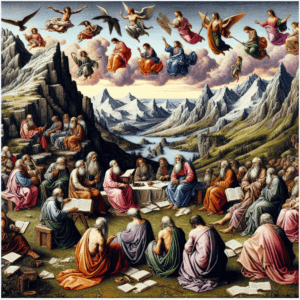 Rebekah has come home to tell her family about some exciting news. A traveler gave her expensive gifts after she unknowingly served as the answer to his prayer (Genesis 24:12–23). His quest is to find a wife for Isaac, the son of his master, Abraham (Genesis 24:3–4).
Rebekah has come home to tell her family about some exciting news. A traveler gave her expensive gifts after she unknowingly served as the answer to his prayer (Genesis 24:12–23). His quest is to find a wife for Isaac, the son of his master, Abraham (Genesis 24:3–4).
This news results in Rebekah’s brother, Laban, coming to the well to meet the man in question. Although Laban will eagerly offer hospitality to Abraham’s servant, much as Rebekah has done, this verse gives us reasons to be wary of Laban’s motives.
Is he simply wanting to welcome in the messenger of a distant relative, or is he most excited by the wealth suggested by the expensive gifts given to Rebekah and her story about the ten camels?
To this point, the only information Laban apparently knows is that a rich and generous man wants to stay at his home overnight. There has been no mention made, yet, that the man is seeking a bride for Isaac, back in the land of Canaan.
In any case, Laban quickly finds Abraham’s servant waiting by the spring. The servant just waited out there at the well to see whether anyone would come out to lead him into the home of Rebekah, whether he really had a welcome or not.
Believe me, when old Laban saw those rings, he knew it was a very wealthy guest. Uncle Laban is not one to miss a deal.
(If you doubt that, ask Jacob later on. Jacob found out that Uncle Laban was a real trader; in fact, he was a better trader than Jacob was.) So Laban went out to welcome the servant.
Genesis 24:31 KJV
And he said, Come in, thou blessed of the LORD; wherefore standest thou without? for I have prepared the house, and room for the camels.
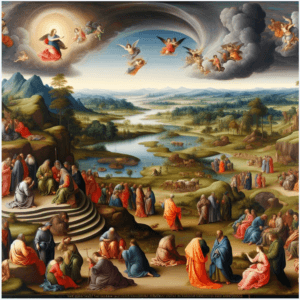 Even old Laban recognized the fact that there was the living God, the Creator, the one God.
Even old Laban recognized the fact that there was the living God, the Creator, the one God.
Rebekah’s brother Laban, hearing her story of everything Abraham’s servant had said to her and seeing the gifts that he gave to her, rushes out to the town well, or spring, and finds the servant waiting there.
At this point, however, all Rebekah or Laban really know is that the man is wealthy and in search of Abraham’s family. To this point, the servant has not revealed that his mission is to find a wife for Abraham’s son, Isaac (Genesis 24:3–4).
Laban addresses the servant warmly, calling him the Lord’s blessed one and inviting his company to come and stay at their house. Hospitality was a critical cultural value in this era, especially among reputable people.
To leave anyone, especially a relative or potential guest, without accommodation would be seen as a grave unkindness.
The quickness and eagerness of Rebekah and Laban in offering hospitality to Abraham’s servant reminds us of Abraham’s own eagerness to offer hospitality to the travelers who turned out to be the Lord and two angels in human form (Genesis 18:1–15).
It reminds us, as well, of Lot’s urgent hospitality to the two strangers, also angels, on Sodom’s final night (Genesis 19:1–3).
Genesis 24:32 KJV
And the man came into the house: and he ungirded his camels, and gave straw and provender for the camels, and water to wash his feet, and the men’s feet that were with him.
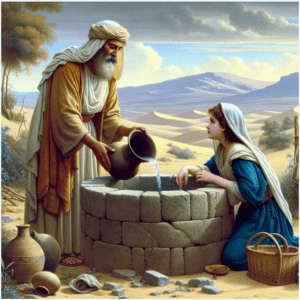 What a beautiful picture of piety, fidelity, and disinterestedness in a servant! Abraham’s servant has recently discovered Rebekah, who seems to be the answer to his prayer (Genesis 24:12–19).
What a beautiful picture of piety, fidelity, and disinterestedness in a servant! Abraham’s servant has recently discovered Rebekah, who seems to be the answer to his prayer (Genesis 24:12–19).
That request was for God to show him the exact woman he ought to bring home as a wife for Abraham’s son, Isaac (Genesis 24: 3–4).
After being warmly invited to stay at their household by Laban, Rebekah’s brother, Abraham’s servant arrives with his company of camels and servants.
The passage provides some historical perspective on what that would look like. The camels would be unharnessed and provided food. All of the men are given the opportunity to wash their feet, which would have been quite filthy from a journey across the open country.
Though mere servants of a wealthy master, all of the men and animals in the company are treated properly, with respect and hospitality. Again, we have this footwashing ceremony. Note that there are quite a few men who have come with this servant.
The servant is entertained royally in this home—Uncle Laban sees to that. We have here a marvelous picture of the relationship of Christ and the church.
One of the figures of speech that is used in the New Testament is that the church is someday to become the bride of Christ. This is the way the church is being won today, through the Holy Spirit whom the Father and the Son have sent into the world.
The Spirit of God, like the servant of Abraham, has come to talk about Another, to take the things of Christ and show them unto us. As this servant has gone to get a bride for Isaac, so the Spirit of God is in the world to call out a bride for Christ.
Notice the marvelous dramatic effect that we have here. This is an exciting story and a wonderful record of that day.
Genesis 24:33 KJV
And there was set meat before him to eat: but he said, I will not eat, until I have told mine errand. And he said, Speak on.
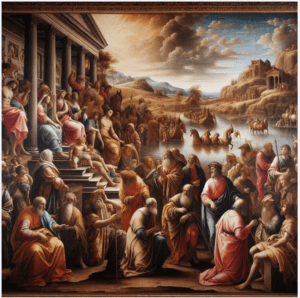 He declined all attention to his own comforts till he had told his name and his errand.
He declined all attention to his own comforts till he had told his name and his errand.
With the Lord’s specific guidance and in answer to the prayers of Abraham’s servant (Genesis 24:12–19), his company has arrived at the household of Rebekah, God’s appointed wife for Isaac (Genesis 24:3–4).
The servant and all with him, including the ten camels, have been shown warm hospitality. The camels have been made comfortable and fed. The men have washed their feet. Now we see that an evening meal has been prepared and set before them.
Abraham’s servant, focused exclusively on fulfilling his master’s mission, states that he will not eat until he presents what he has come to say.
His host is perhaps surprised to learn the servant has an urgent message after what appeared to be a simple chance meeting with his daughter Rebekah at the well outside the city. Still, he urges the servant to speak.
In the verses that follow, the servant will tell Rebekah, her father, and her brother the entire story of how and why he has come to them.
Abraham’s servant says, “Before I can eat, I want to tell you my mission” This is also characteristic of the Holy Spirit who has come into the world to tell about Another. That is primary business as far as God is concerned.
I know that there are other businesses that are very important: the business of our government, the great business of the news media, and the great corporations, the automobile and the airplane companies.
All this is important, great business. But God is not continuing to deal with this world because of General Motors or the government in Washington, D.C. (whether Republican or Democrat). The stock market on Wall Street is of no great concern in heaven.
The thing that is primary as far as God is concerned is to get the gospel out to the peoples of the world. The Spirit of God is here to put this first. The servant of Abraham will not eat before he has spoken, and so they tell him to speak on.
Genesis 24:34 KJV
And he said, I am Abraham’s servant.
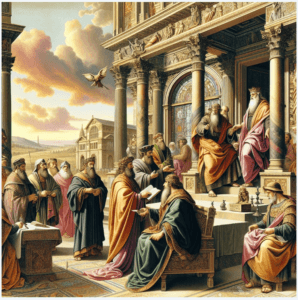 Abraham’s servant is convinced that God has chosen Rebekah to be Isaac’s wife. Now sitting before her father and brother, the servant will tell the story of how he came to them and make his case for why they should accept this offer of marriage on her behalf.
Abraham’s servant is convinced that God has chosen Rebekah to be Isaac’s wife. Now sitting before her father and brother, the servant will tell the story of how he came to them and make his case for why they should accept this offer of marriage on her behalf.
He begins by revealing who he and his master are. He doesn’t name himself—despite assumptions that this man is Eliezer (Genesis 15:2), he is never identified in this particular story. In fact, the servant never sees himself as central to the story, at all.
This is not even about him. He represents Abraham. For the first time, he reveals to them that their relative Abraham, Nahor’s own brother, is his master and the reason he is before them now. Notice that his name is not given.
Likewise, the Lord Jesus said that when the Holy Spirit comes, He will not speak of Himself, but He will take the things of Mine and show them unto you (see John 16:13–15).
By the way, what is the name of the Holy Spirit?
He has no name. He does not come to speak of Himself; He has come to speak of Another, of Christ. Similarly, this servant is not named but is simply called a servant of Abraham.
Genesis 24:35 KJV
And the LORD hath blessed my master greatly; and he is become great: and he hath given him flocks, and herds, and silver, and gold, and menservants, and maidservants, and camels, and asses.
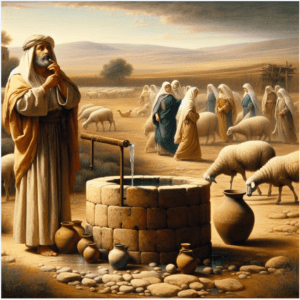 Abraham’s servant begins to present his case for why Rebekah’s father and brother should grant permission for her to travel back to Canaan and marry Abraham’s son. He first brings news of how Nahor’s brother Abraham is faring.
Abraham’s servant begins to present his case for why Rebekah’s father and brother should grant permission for her to travel back to Canaan and marry Abraham’s son. He first brings news of how Nahor’s brother Abraham is faring.
In short, he’s very, very wealthy. The servant gives the Lord credit for this. God has greatly blessed Abraham, and he is truly a great man. All of Abraham’s great wealth has come from the Lord, including flocks, herds, silver, gold, servants, camels, and donkeys.
The servant knew that the family had already seen ten of the camels. That alone would have been a sign of Abraham’s wealth.
Part of the reason for emphasizing Abraham’s wealth, of course, will be to assure the family that Rebekah would be richly provided for as a member of this family.
For the servant, the point is also to assure them that this is a family blessed by the Lord, an even greater reason to trust that she will be secure. The servant tells about the father’s house. And that is something that the Spirit of God would have us know about.
He convicts the world of sin, righteousness, and judgment—those are the three things that He talks about to the lost world. He would have us know that the judgment is upon a sinful earth and upon mankind. Men are lost today because they are sinners.
I hear it said that men are lost because they reject Christ. They are not lost because they reject Christ; they are lost because they are sinners. Whether they have heard about Him or not, they are lost sinners. That is the condition of man today.
The Holy Spirit has come to let us know that there is a Savior who has borne our judgment and who has been made over to us righteousness and that we can have a standing in heaven. The Holy Spirit has come to speak of Another.
“And the LORD hath blessed my master greatly.” And, my friend, our Heavenly Father is rich today in cattle and in goods. The cattle on a thousand hills are His. How great our Father is!
Genesis 24:36 KJV
And Sarah my master’s wife bare a son to my master when she was old: and unto him hath he given all that he hath.
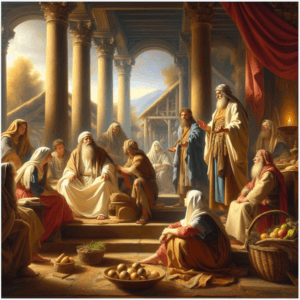 Abraham’s servant is describing the reason for his journey to Rebekah and her family. Though they don’t realize it just yet, he is also making the case for the marriage proposal he is about to extend to Rebekah on behalf of Abraham’s son Isaac (Genesis 24:3–4).
Abraham’s servant is describing the reason for his journey to Rebekah and her family. Though they don’t realize it just yet, he is also making the case for the marriage proposal he is about to extend to Rebekah on behalf of Abraham’s son Isaac (Genesis 24:3–4).
After establishing Abraham’s great wealth and status, given by God, the servant now introduces Isaac. It matters that they know Isaac was born to Sarah when she was old, to establish that Isaac is not as much older than Rebekah as they might otherwise imagine.
It also helps for them to understand that all of Abraham’s great wealth and status and blessing will pass to Isaac alone. The servant is painting the picture of a supremely eligible bachelor, which indeed Isaac was.
In an infinitely greater way, the Lord Jesus is the Inheritor, and we are joint heirs with Him today. The servant of Abraham has come to tell this family that he is after a bride for his master’s son who is going to inherit all things.
Genesis 24:37 KJV
And my master made me swear, saying, Thou shalt not take a wife to my son of the daughters of the Canaanites, in whose land I dwell:
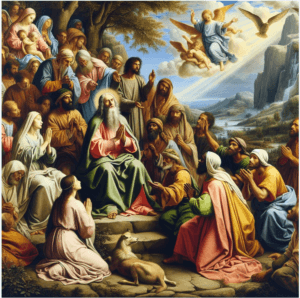 Abraham’s servant has described the wealthy status of Abraham and his unmarried son Isaac, living in Canaan. Now he begins to describe the circumstances around his visit to Nahor, the town, and Nahor’s extended family.
Abraham’s servant has described the wealthy status of Abraham and his unmarried son Isaac, living in Canaan. Now he begins to describe the circumstances around his visit to Nahor, the town, and Nahor’s extended family.
He starts by answering the obvious question: Why has Isaac not married a local girl? The servant’s oath answers the question: Abraham forbids it. Isaac must not marry any of the women in Canaan.
This was an issue of culture and spirituality for Abraham, not one of race. His concern was about mixing the godless approach of the Canaanites with that of his family. Later, this prohibition would become an official part of God’s law for the people of Israel (Deuteronomy 7:1–4).
Rebekah’s family will not likely understand Abraham’s concern about Isaac marrying a Canaanite and losing his unique identity among the people there, but they will grasp the point that, for Isaac, the local women are not eligible.
The Holy Spirit is calling out sinners, but they are sinners who are “. . . born again, not of corruptible seed, but of incorruptible, by the word of God, which liveth and abideth for ever” (1 Pet. 1:23).
These are the ones He is calling out—yes, sinners—but they have been made children of God. “. . . If any man be in Christ, he is a new creature . . .” (2 Cor. 5:17). God is not taking “Canaanites”; His children must be transformed.
Genesis 24:38 KJV
But thou shalt go unto my father’s house, and to my kindred, and take a wife unto my son.
 Abraham’s servant is describing, in very precise detail, what has brought him to the household of Bethuel and his family.
Abraham’s servant is describing, in very precise detail, what has brought him to the household of Bethuel and his family.
He is on a mission from Abraham to find a wife for Isaac. Isaac must not marry from among the women in Canaan (Genesis 24:3–4).
Instead, Abraham sent the servant to the clan of Abraham’s people, to his father’s house, to find a worthy wife for his son.
This is likely the first moment in which Rebekah and her family begin to understand that the servant is here to raise the issue of marriage.
Genesis 24:39 KJV
And I said unto my master, Peradventure the woman will not follow me.
 Abraham’s servant is telling Rebekah and her family the reason for his arrival at their doorstep.
Abraham’s servant is telling Rebekah and her family the reason for his arrival at their doorstep.
Abraham has sent the servant back to his people to find a wife for his son Isaac (Genesis 24:3–4).
The servant recalls challenging Abraham with the possibility that an eligible bride, once located, might not be willing to move away from her family to live in the land of Canaan with an unknown husband (Genesis 24:5–8).
He will share Abraham’s response in the following verse.

A Bride For Isaac – part 7
Finally, he asks if they will give Rebekah in marriage to his master Abraham’s son Isaac. They agree, stating that they could do nothing else given what the servant has told them (Genesis 24:28–51).
Genesis 24:40-51 KJV
[40] And he said unto me, The LORD, before whom I walk, will send his angel with thee, and prosper thy way; and thou shalt take a wife for my son of my kindred, and of my father’s house:
[41] Then shalt thou be clear from this my oath, when thou comest to my kindred; and if they give not thee one, thou shalt be clear from my oath.
[42] And I came this day unto the well, and said, O LORD God of my master Abraham, if now thou do prosper my way which I go:
[43] Behold, I stand by the well of water; and it shall come to pass, that when the virgin cometh forth to draw water, and I say to her, Give me, I pray thee, a little water of thy pitcher to drink;
[44] And she say to me, Both drink thou, and I will also draw for thy camels: let the same be the woman whom the LORD hath appointed out for my master’s son.
[45] And before I had done speaking in mine heart, behold, Rebekah came forth with her pitcher on her shoulder; and she went down unto the well, and drew water: and I said unto her, Let me drink, I pray thee.
[46] And she made haste, and let down her pitcher from her shoulder, and said, Drink, and I will give thy camels drink also: so I drank, and she made the camels drink also.
[47] And I asked her, and said, Whose daughter art thou? And she said, The daughter of Bethuel, Nahor’s son, whom Milcah bare unto him: and I put the earring upon her face, and the bracelets upon her hands.
[48] And I bowed down my head, and worshipped the LORD, and blessed the LORD God of my master Abraham, which had led me in the right way to take my master’s brother’s daughter unto his son.
[49] And now if ye will deal kindly and truly with my master, tell me: and if not, tell me; that I may turn to the right hand, or to the left.
[50] Then Laban and Bethuel answered and said, The thing proceedeth from the LORD: we cannot speak unto thee bad or good.
[51] Behold, Rebekah is before thee, take her, and go, and let her be thy master’s son’s wife, as the LORD hath spoken.
Genesis 24:40 KJV
And he said unto me, The LORD, before whom I walk, will send his angel with thee, and prosper thy way; and thou shalt take a wife for my son of my kindred, and of my father’s house:
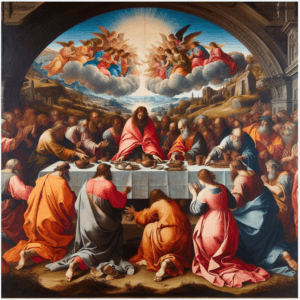 Abraham’s servant is describing in great detail to Rebekah and her family the reason for his journey to their home. Abraham has sent the servant back to his people to find a wife for his son Isaac (Genesis 24:3–4).
Abraham’s servant is describing in great detail to Rebekah and her family the reason for his journey to their home. Abraham has sent the servant back to his people to find a wife for his son Isaac (Genesis 24:3–4).
The servant recalled, in the previous verse, challenging Abraham with the possibility that an eligible bride, once located, might not be willing to move away from her family to live in the land of Canaan with an unknown husband (Genesis 24:5–8).
Now he shares Abraham’s response: The Lord will intervene. More specifically, the Lord will send an angel to give the mission success. Abraham knows this because he himself has walked with the Lord.
Abraham insists that the servant will succeed: He will take a wife for Isaac from among Abraham’s people. As the servant will explain, he has also seen evidence that God is working to bring Rebekah back to Canaan.
Genesis 24:41 KJV
Then shalt thou be clear from this my oath, when thou comest to my kindred; and if they give not thee one, thou shalt be clear from my oath.
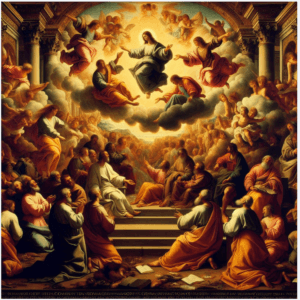 Abraham’s servant is describing to Rebekah and her family the reason for his journey to their home. Abraham has sent the servant back to his people to find a wife for his son Isaac (Genesis 24:3–4).
Abraham’s servant is describing to Rebekah and her family the reason for his journey to their home. Abraham has sent the servant back to his people to find a wife for his son Isaac (Genesis 24:3–4).
Perhaps to make clear that he, the servant, realizes a woman may not want to travel back to Canaan to marry a stranger, he has told them that he raised this possibility with Abraham.
Abraham told him that an angel would go with him to bring success to the quest (Genesis 24:5–8).
Now, though, the servant makes clear to Rebekah, her father, and her brother, that he has fully fulfilled his oath to Abraham simply by coming to Abraham’s family and making the attempt to find a willing wife for Isaac.
His oath does not require that a woman return with him to Canaan. The servant is bound only to seek out the right woman—not to come back with a marriageable woman at all costs.
Genesis 24:42 KJV
And I came this day unto the well, and said, O LORD God of my master Abraham, if now thou do prosper my way which I go:
 In the previous verses, the servant described to Rebekah and her family how Abraham had commissioned him to swear to travel to the land of Abraham’s people and attempt to find a wife for Abraham’s son Isaac (Genesis 24:3–4).
In the previous verses, the servant described to Rebekah and her family how Abraham had commissioned him to swear to travel to the land of Abraham’s people and attempt to find a wife for Abraham’s son Isaac (Genesis 24:3–4).
Now the servant moves on to the part of the story that happened earlier that day. He begins by describing his prayer to God upon arriving at the spring/well outside their city (Genesis 24:12–14).
He tells them of praying to the God of his master Abraham. This was the God he had already given credit for blessing Abraham with wealth and making him a great man.
This verse begins the specific request the servant made of the Lord. It concludes in the following two verses.
Genesis 24:43 KJV
Behold, I stand by the well of water; and it shall come to pass, that when the virgin cometh forth to draw water, and I say to her, Give me, I pray thee, a little water of thy pitcher to drink;
 Abraham’s servant is describing to Rebekah and her family what he prayed to Abraham’s God earlier that day when he arrived at the well outside of their town.
Abraham’s servant is describing to Rebekah and her family what he prayed to Abraham’s God earlier that day when he arrived at the well outside of their town.
He tells how he placed a kind of test on the Lord to find the right young woman; his choice of words here confirms that he is, as expected, seeking a “virgin” for Isaac. He will ask her to give him a little water to drink from her jar.
If she responds in the way described in the following verse, the servant is asking the Lord to allow that young woman to be the one He has appointed for Isaac (Genesis 24:12–14).
As Rebekah listened to this story, the light must have begun to come on in her mind. She was the answer to the servant’s prayer!
Genesis 24:44 KJV
And she say to me, Both drink thou, and I will also draw for thy camels: let the same be the woman whom the LORD hath appointed out for my master’s son.
 Abraham’s servant is in the middle of describing to Rebekah and her family what he prayed when he arrived at the spring outside their city earlier that day.
Abraham’s servant is in the middle of describing to Rebekah and her family what he prayed when he arrived at the spring outside their city earlier that day.
He had asked his master’s God to allow him to know the woman appointed to marry Abraham’s son, Isaac, by her response to his request for a drink of water (Genesis 24:12–14).
Now he reveals what response he had asked God to use as a sign to him that he had found the woman. She would offer to draw water for his camels, as well, without being asked (Genesis 24:15–19).
Rebekah would now have understood clearly where the servant’s story was headed. Her father and brother likely began to understand, as well.
The servant is in the process of asking Rebekah to come back to Canaan with him, so that she can marry Abraham’s son, Isaac.
Genesis 24:45 KJV
And before I had done speaking in mine heart, behold, Rebekah came forth with her pitcher on her shoulder; and she went down unto the well, and drew water: and I said unto her, Let me drink, I pray thee.
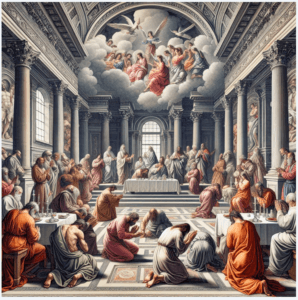 Abraham’s servant is describing the events around his meeting with Rebekah earlier that day by the spring outside the city.
Abraham’s servant is describing the events around his meeting with Rebekah earlier that day by the spring outside the city.
He had asked Abraham’s God to allow the woman who offered to water his camels to be the one appointed to marry Abraham’s son Isaac (Genesis 24:12–14).
Now he reveals that before he had even finished thinking his prayer, “speaking in my heart,” Rebekah walked into view with her water jar. After she filled it at the spring, the servant describes what he asked when he approached her: “Please let me drink.”
The fact that Rebekah can verify that all happened exactly as the servant described from this moment in the story on will give credibility to the servant’s account (Genesis 24:15–19).
Genesis 24:46 KJV
And she made haste, and let down her pitcher from her shoulder, and said, Drink, and I will give thy camels drink also: so I drank, and she made the camels drink also.
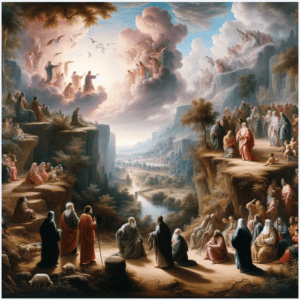 Abraham’s servant now reveals the first pivotal moment in his interaction with Rebekah by the spring outside of town earlier that day.
Abraham’s servant now reveals the first pivotal moment in his interaction with Rebekah by the spring outside of town earlier that day.
He had already set up the fact that he had prayed to Abraham’s God, asking that the young woman who offered to water his camels without being asked would be the one appointed by God to be Isaac’s wife (Genesis 24:12–15).
Then the servant tells Rebekah’s father Bethuel and brother Laban what she already understood: She offered to do exactly as the servant had prayed. Her response lined up precisely with the servant’s prayer (Genesis 24:16–19).
The servant will soon describe the second piece of information that convinced him Rebekah was truly God’s woman for Isaac.
Genesis 24:47 KJV
And I asked her, and said, Whose daughter art thou? And she said, The daughter of Bethuel, Nahor’s son, whom Milcah bare unto him: and I put the earring upon her face, and the bracelets upon her hands.
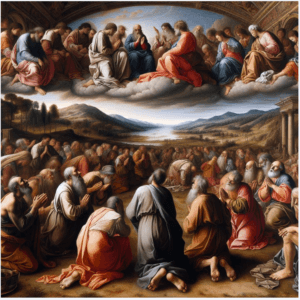 Abraham’s servant now describes the final bit of information he learned from Rebekah during their encounter at the spring earlier that day. This in the information that fully convinced him God had led him straight to Rebekah as the woman meant to marry Isaac.
Abraham’s servant now describes the final bit of information he learned from Rebekah during their encounter at the spring earlier that day. This in the information that fully convinced him God had led him straight to Rebekah as the woman meant to marry Isaac.
The servant had asked Rebekah who her father was. She answered with names the servant knew: Her father was Bethuel, the son of Nahor and Milcah. The servant could not have found any closer relatives to Abraham than these.
Interestingly, the servant describes giving Rebekah the gift of the nose ring and bracelets after asking who her father was (Genesis 24:22–24).
Perhaps he simply mixed up the order or perhaps he felt that Rebekah’s father and brother would feel the gifts would have been more appropriately given after knowing what family Rebekah was from.
As in other instances, Scripture faithfully records the truth of what certain people said or did, without necessarily claiming those words are accurate.
Genesis 24:48 KJV
And I bowed down my head, and worshipped the LORD, and blessed the LORD God of my master Abraham, which had led me in the right way to take my master’s brother’s daughter unto his son.
 Abraham’s servant describes his joy at discovering that the woman God led him to for Isaac was, in fact, the granddaughter of Abraham’s own brother.
Abraham’s servant describes his joy at discovering that the woman God led him to for Isaac was, in fact, the granddaughter of Abraham’s own brother.
His joy is expressed in his response: He immediately worshiped and blessed the Lord who led him on a straight path to Rebekah (Genesis 24:3–4; 12–19).
The servant was not at all shy about worshiping the Lord in front of Rebekah or describing his worship of God to her family.
In fact, the Lord was the central character in the servant’s story, acting to bring about the best possible result, at least from the servant’s perspective.
It’s unclear what Bethuel, Laban, and Rebekah thought about this God of Abraham. They lived in a part of the world known for its worship of the moon. The worship of various gods was built into the culture of the day.
Did they know of Abraham’s Lord specifically or simply accept the idea of Him as one of many possible unknown gods in the world?
How much had Abraham told them about his visit from the Lord before he moved away?
We just don’t know.
Genesis 24:49 KJV
And now if ye will deal kindly and truly with my master, tell me: and if not, tell me; that I may turn to the right hand, or to the left.
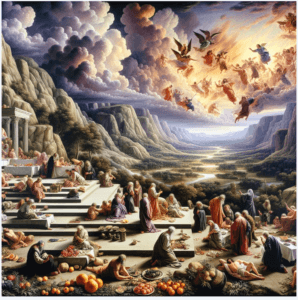 Abraham’s servant finally reaches the end of his story. He has made his case for why they should agree to allow Rebekah to return with him to Canaan and marry Abraham’s son Isaac.
Abraham’s servant finally reaches the end of his story. He has made his case for why they should agree to allow Rebekah to return with him to Canaan and marry Abraham’s son Isaac.
First, Abraham and, by extension, Isaac, are blessed by God and extremely wealthy.
Second, the Lord had shown the servant that Rebekah was the girl appointed to marry Isaac by meeting the servant’s test exactly.
Finally, the Lord had guided the servant straight to Abraham’s immediate family. Clearly, this is meant to be.
So the servant asks the question, perhaps with a bit of manipulation: Are you going to show steadfast love and faithfulness to my master?
He uses the same language he has used to describe how God has treated Abraham.
Will Abraham’s family members also treat him with kindness and good faith?
If not, they should tell him so that he can take his search elsewhere.
Their positive response in the next verse may have been hasty, as the following verses will show. It would have been difficult to say no to the servant’s question after hearing his remarkable story, but perhaps Laban and his father were not yet fully ready to let her go.
Genesis 24:50 KJV
Then Laban and Bethuel answered and said, The thing proceedeth from the LORD: we cannot speak unto thee bad or good.
 The brothers conduct all the marriage negotiations, their father being probably dead, and without consulting their sister. Their language seems to indicate they were worshippers of the true God.
The brothers conduct all the marriage negotiations, their father being probably dead, and without consulting their sister. Their language seems to indicate they were worshippers of the true God.
After hearing the full story from Abraham’s servant and then hearing his forceful question—will you show loving kindness and faithfulness to Abraham—Rebekah’s brother and father quickly respond that the decision is not theirs to make, after all.
The implication of their words is that if this from the Lord, it doesn’t even matter what they might think, “bad or good.” While this seems to be a positive response, in a way, it is not the end of the story.
After the servant gives additional gifts and stays for the night (Genesis 24:52–53), the family will realize how quickly Rebekah will be gone, and try to negotiate for her to stay a while longer (Genesis 24:54–55).
Genesis 24:51 KJV
Behold, Rebekah is before thee, take her, and go, and let her be thy master’s son’s wife, as the LORD hath spoken.
 Laban and Bethuel, Rebekah’s brother and father, have respond to the servant’s urgent question about whether they would allow Rebekah to marry Isaac by saying, in essence, that it is not theirs to say. They have seen in the servant’s story that this is the Lord’s will.
Laban and Bethuel, Rebekah’s brother and father, have respond to the servant’s urgent question about whether they would allow Rebekah to marry Isaac by saying, in essence, that it is not theirs to say. They have seen in the servant’s story that this is the Lord’s will.
How could they disagree?
And now they say the words the servant has been longing to hear: Yes, take her and go. Let her be the wife of Abraham’s son. The Lord has spoken. Rebekah’s family reveals that they at least respected Abraham’s God. They saw His will as necessary.
They agreed to follow it, as the servant had described it. Upcoming verses will show, however, that the prospect of Rebekah leaving so soon will become an issue. The family will try to negotiate a delay, which Abraham’s servant cannot accept (Genesis 24:55–56).

A Bride For Isaac – part 8
The second thing to notice in this chapter is the straightforward manner in which Rebekah made her decision to go with the servant and become the bride of Isaac. This is a tremendous thing which we will notice as we go through.
After a brief negotiation the next morning, Rebekah agrees to leave that very day to travel with the servant to the land of Canaan.
Genesis 24:52-59 KJV
[52] And it came to pass, that, when Abraham’s servant heard their words, he worshipped the LORD, bowing himself to the earth.
[53] And the servant brought forth jewels of silver, and jewels of gold, and raiment, and gave them to Rebekah: he gave also to her brother and to her mother precious things.
[54] And they did eat and drink, he and the men that were with him, and tarried all night; and they rose up in the morning, and he said, Send me away unto my master.
[55] And her brother and her mother said, Let the damsel abide with us a few days, at the least ten; after that she shall go.
[56] And he said unto them, Hinder me not, seeing the LORD hath prospered my way; send me away that I may go to my master.
[57] And they said, We will call the damsel, and enquire at her mouth.
[58] And they called Rebekah, and said unto her, Wilt thou go with this man? And she said, I will go.
[59] And they sent away Rebekah their sister, and her nurse, and Abraham’s servant, and his men.
Genesis 24:52 KJV
And it came to pass, that, when Abraham’s servant heard their words, he worshipped the LORD, bowing himself to the earth.
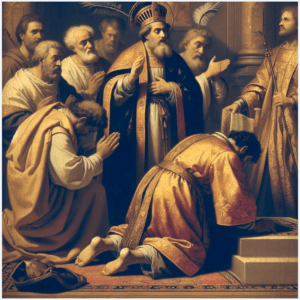 Abraham’s servant again demonstrates his trust in the Lord, the God of Abraham. His mission to find a wife for Isaac among Abraham’s relatives has been successful well beyond what he likely imagined.
Abraham’s servant again demonstrates his trust in the Lord, the God of Abraham. His mission to find a wife for Isaac among Abraham’s relatives has been successful well beyond what he likely imagined.
Within the space of a few hours, he has gone from asking the Lord to lead him to the woman appointed for Isaac (Genesis 24:12–15) to securing an agreement from Rebekah’s family to allow her to travel with him back to Canaan for the marriage (Genesis 24:51).
The servant has acted in complete dependence on the Lord and now responds again by bowing before God in praise and worship for the success of his master’s mission. In a way, the servant’s relationship with God comes very close to our own.
Rarely do Christians experience the kind of visits from the Lord that Adam, Noah, and Abraham did. Most often, we bring to Him our requests, speaking to Him in our hearts (Genesis 24:45), and we take on faith that the circumstances that unfold include His direction to go one way or another.
In looking back, we accept that the Lord has been leading us along the way to accomplish His will, especially as we have been in submission to Him. That’s certainly how Abraham’s servant viewed his own interactions with the Lord.
Genesis 24:53 KJV
And the servant brought forth jewels of silver, and jewels of gold, and raiment, and gave them to Rebekah: he gave also to her brother and to her mother precious things.
 These are the usual articles, with money, that form a woman‘s dowry among the pastoral tribes. Rebekah was betrothed and accompanied the servant to Canaan.
These are the usual articles, with money, that form a woman‘s dowry among the pastoral tribes. Rebekah was betrothed and accompanied the servant to Canaan.
After securing the approval of Rebekah’s brother and father to take her with him back to the land of Canaan to marry Isaac (Genesis 24:51), the servant now concludes the arrangement with the giving of gifts to Rebekah, her mother, and her brother Laban.
These gifts include silver and gold jewelry, as well as garments and expensive ornaments. These gifts would be part of the traditional wedding dowry of the times, items of value given to both the bride and the family of the bride by the bridegroom’s family.
This is the way the Spirit gives to the children of God. We have the earnest, the guarantee, of the Spirit when we come to Christ.
Being justified by faith, we have peace with God, we have access, we have joy, we have a hope, and we have the Holy Spirit (see Rom. 5:1–5), These are the wonderful things that have been made over to the believer today.
Genesis 24:54 KJV
And they did eat and drink, he and the men that were with him, and tarried all night; and they rose up in the morning, and he said, Send me away unto my master.
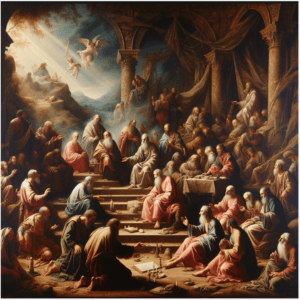 With his oath to Abraham satisfied and his duty to secure a wife for Isaac satisfied in miraculous time, the servant finally allows himself to relax. He and his men eat and drink and rest for the night.
With his oath to Abraham satisfied and his duty to secure a wife for Isaac satisfied in miraculous time, the servant finally allows himself to relax. He and his men eat and drink and rest for the night.
When morning comes, however, the servant is back on duty. He is eager to get on the road and back home to Abraham and Isaac, much more quickly than Rebekah’s family anticipated she would be leaving (Genesis 24:55).
Knowing that she would be leaving for a distant land, likely forever, they will attempt to convince Abraham’s servant to let Rebekah stay a few more days. The very next morning this servant says, “I want to be on my way.” I’ll tell you, this is big business for him!
Genesis 24:55 KJV
And her brother and her mother said, Let the damsel abide with us a few days, at the least ten; after that she shall go.
 Abraham’s servant has been successful in his mission. He has secured not just an appropriate wife for Abraham’s son; he has found an exceptional young woman of Abraham’s own immediate family (Genesis 24:3–4; 12–19).
Abraham’s servant has been successful in his mission. He has secured not just an appropriate wife for Abraham’s son; he has found an exceptional young woman of Abraham’s own immediate family (Genesis 24:3–4; 12–19).
Now he is eager to get on the road back to Canaan. Perhaps he just can’t wait to show Abraham how the Lord has blessed their quest, or maybe he is concerned about the family changing their minds.
The journey back to Canaan would have taken some time, as well, so any further delays would have only added to a long wait for Abraham and Isaac.
In any case, Rebekah’s brother Laban and her mother are not ready to let her go quite so quickly. Most Bible translations understand the text as a request for her to stay with them for another 10 days or so.
However, some scholars believe the original language to be a request for Rebekah to stay for as long as a year.
Given what’s at stake, their request feels reasonable to us. To send a daughter off with a man they had known for less than a day to be married and settled in a strange land far away must have been emotional.
Marriage, at that time, often involved a complete separation from family. However, this event is still sudden and unexpected.
“What’s your hurry?
Give us at least ten days to tell her good-bye. After all, we had better talk this over with her” Most of us would expect some time to process the idea and perhaps hear more about Abraham, Isaac, and this new life they were sending Rebekah off to.
As the following verses make clear, however, the servant wasn’t interested in waiting even a day to depart.
Genesis 24:56 KJV
And he said unto them, Hinder me not, seeing the LORD hath prospered my way; send me away that I may go to my master.
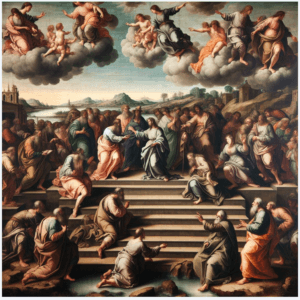 Why was Abraham’s servant eager to leave with Rebekah so quickly after her family agreed to the marriage proposal? They had requested, very reasonably, 10 days or so delay before sending her off to be married in a strange land.
Why was Abraham’s servant eager to leave with Rebekah so quickly after her family agreed to the marriage proposal? They had requested, very reasonably, 10 days or so delay before sending her off to be married in a strange land.
Abraham’s servant insisted on not being delayed. His reason is hard to understand: “since the Lord has prospered my way.”
Did the servant feel that delaying their departure would somehow dishonor the success God had granted to him?
Perhaps he was concerned that, given time to think about their agreement, Rebekah’s family might change their mind.
He might have assumed that, since God had granted his request to find the right woman so quickly, that God also intended this mission to be completed as soon as possible.
One more possibility is that the servant was concerned Abraham might die before he could get back with this wife for Isaac. Abraham’s words to the servant at the beginning of this chapter did sound like those of a dying man.
Though Abraham went on to live several more decades, perhaps his health status was questionable for a season. And, lest we forget, Abraham is more than 130 years old at this point (Genesis 17:17; 21:5; 23:1–2).
In any case, the servant wants to leave—immediately!
Genesis 24:57 KJV
And they said, We will call the damsel, and enquire at her mouth.
 Rebekah’s father and brother had agreed to allow her to marry Isaac, to go with Abraham’s servant back to the land of Canaan to settle there (Genesis 24:3–4; 51).
Rebekah’s father and brother had agreed to allow her to marry Isaac, to go with Abraham’s servant back to the land of Canaan to settle there (Genesis 24:3–4; 51).
They had, however, requested that she be allowed to stay with them for another ten days or so before leaving (Genesis 24:55).
They know full well that this is a one-way trip; Rebekah will not be making visits back to Mesopotamia, but will be moving permanently to her new family.
Abraham’s servant insisted on not being delayed. He felt they needed to leave right away. Now for the first time, Rebekah is allowed a say in the matter. The family suggests they ask her if she is willing to go with Abraham’s servant so quickly.
It’s possible they presumed that Rebekah would agree with them about waiting a few days before her departure. If she didn’t want to go just yet, it would be difficult for Abraham’s servant to compel them to make her leave with him so soon.
Genesis 24:58 KJV
And they called Rebekah, and said unto her, Wilt thou go with this man? And she said, I will go.
 For the first time, apparently, Rebekah is being given some say in the matter of whether she will go with Abraham’s servant back to Canaan.
For the first time, apparently, Rebekah is being given some say in the matter of whether she will go with Abraham’s servant back to Canaan.
At least she is being asked if she is willing to leave immediately for this strange country to be married to a man she has not met before.
It’s possible that her brother and mother believed that, if asked, Rebekah would agree with them about waiting a few days. If so, they must have been disappointed about her immediate agreement: “I will go.”
We’re not told if Rebekah’s willingness to leave so quickly was due to a difficult relationship with her family or, more likely, if it represented a willingness to do the Lord’s will as it had been so dramatically revealed in her life the day before.
In either case, her statement is the final word. The family has agreed to terms, and Rebekah is willing. The company will prepare to depart.
Let’s take another look at this picture. It is an oriental scene, couched way back yonder in the beginning of time, at the dawn of humanity, in a way.
Although I am confident that man had been on this earth thousands of years at this time, as far as we are concerned, this was approximately four thousand years ago. This family is entertaining a guest, a stranger, and they are entertaining him royally.
They have fed his camels and taken care of the servants. They have set meat before him, a real feast, but he wanted to state his business. And so he tells his strange business. He has come to get a bride for his master’s son, Isaac.
I can see this servant as he brings out the gifts to give to this family—gold and silver trinkets. Abraham, you must remember, was a very rich man. Then the servant begins to tell about the master.
As he speaks, I see that family circle around the fire, and in the background, standing just beyond the others, I see a very beautiful girl with deep brown eyes. She is listening intently. She hears the servant tell about Abraham and about how Isaac was born.
The servant tells about Isaac’s miraculous birth and about his life. Then he tells about the day that his father took him yonder to the top of Mount Moriah to offer him as a sacrifice and how God spared him and would not take his life but gave him back to the father alive.
And finally he tells how the father has sent him, a servant, to get a bride for Isaac. They do not want to get a bride for him from among the Canaanites.
They must get one who is of like mind, one who has the same capacity for the living God, one who is born again of the Word of God. He is looking for a bride. Rebekah has been listening all this time, and now they turn to her.
No one has paid much attention to her up to this point, but now all eyes turn to her, and they say, “Rebekah, what about it? Will you go with this man?” She does not hedge or fudge or beat around the bush or hesitate.
She says, “I will go.” Have you ever noticed that the men whom the Lord Jesus called as His disciples made the same instant decision? They left their nets and followed Him.
Oh, I know that they went back a couple of times, but there came a day when they broke loose from those nets, and they never went back to them. They followed Him; they went with Him. The Holy Spirit is still calling today.
He is the One who has taken the servant’s place. You see, the Father and the Spirit sent the Son into the world to die for the world. And when the Son went back to heaven, He said He would send the Holy Spirit, the Comforter.
The Spirit has now come into the world, and He is calling out a bride. He is saying, “Will you go? Here is the One who died for you. He will save you. You have to be redeemed first. You have to come as a sinner to Him, take your rightful position, and accept Him as Savior.
When you do, you will be born again; you will become a child of God and be put into the church that is going to be presented to Him someday as a bride.”
The question is: Will you go?
Will you accept the invitation?
Will you trust Christ as your Savior?
This is not something about which you can beat around the bush—you either do it or you don’t. I never shall forget the time that I was speaking in a certain place in Texas. I presented Christ, and then I asked, “Will you accept Him?”
I really wasn’t through preaching, but I never shall forget a young man who sat there, and I could tell he was interested. He got up right there and then and walked down. It had a tremendous effect upon the audience.
He was not wishywashy; there wasn’t anything uncertain about him. My, I love a clean-cut decision like that! That is the way He wants you, my friend. That is the way He will accept you, and it is the only way He will accept you.
This does not end the story. They start out now, and they are going back to the Promised Land.
Genesis 24:59 KJV
And they sent away Rebekah their sister, and her nurse, and Abraham’s servant, and his men.
 With Rebekah’s agreement to an immediate departure for her future in Canaan with Isaac, her family agreed to let her go. More specifically, they sent her away. It was truly their decision to make, and they did as she wished.
With Rebekah’s agreement to an immediate departure for her future in Canaan with Isaac, her family agreed to let her go. More specifically, they sent her away. It was truly their decision to make, and they did as she wished.
Along with Rebekah, they send her nurse, likely a caregiving servant/nanny who has helped to raise Rebekah from a small child. We will learn later that the nurse’s name is Deborah (Genesis 35:8).
They also send along with Rebekah some of her “young women” or servant girls (Genesis 24:61). Abraham’s servant and his men are released by the family to depart as well.
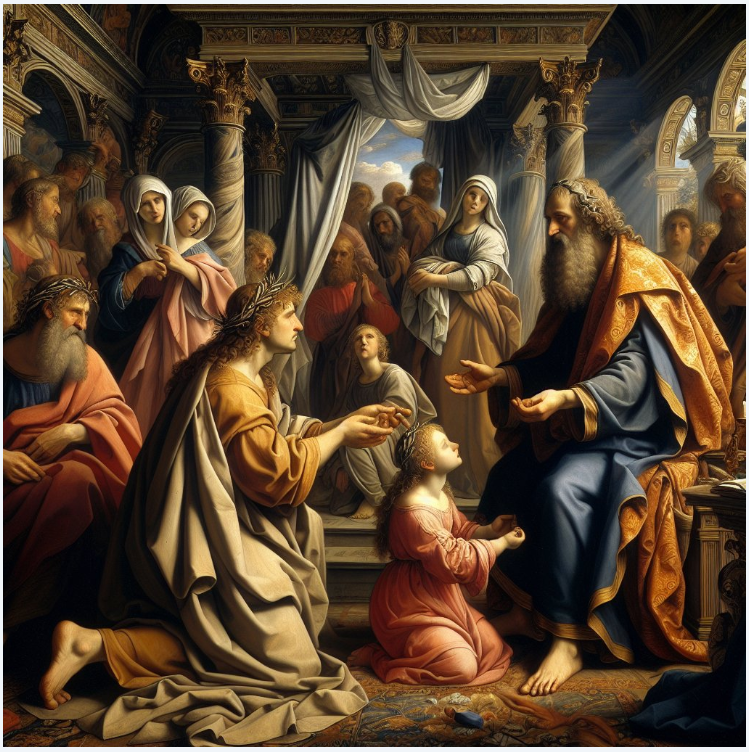
A Bride For Isaac – part 9
At the end of the journey, she meets Isaac, now 40, for the first time (Genesis 25:20). He allows her to live in the tent of his late mother Sarah, and soon they are happily wed (Genesis 24:52–67).
Genesis 24:60-67 KJV
[60] And they blessed Rebekah, and said unto her, Thou art our sister, be thou the mother of thousands of millions, and let thy seed possess the gate of those which hate them.
[61] And Rebekah arose, and her damsels, and they rode upon the camels, and followed the man: and the servant took Rebekah, and went his way.
[62] And Isaac came from the way of the well Lahai–roi; for he dwelt in the south country.
[63] And Isaac went out to meditate in the field at the eventide: and he lifted up his eyes, and saw, and, behold, the camels were coming.
[64] And Rebekah lifted up her eyes, and when she saw Isaac, she lighted off the camel.
[65] For she had said unto the servant, What man is this that walketh in the field to meet us? And the servant had said, It is my master: therefore she took a vail, and covered herself.
[66] And the servant told Isaac all things that he had done.
[67] And Isaac brought her into his mother Sarah’s tent, and took Rebekah, and she became his wife; and he loved her: and Isaac was comforted after his mother’s death.
Genesis 24:60 KJV
And they blessed Rebekah, and said unto her, Thou art our sister, be thou the mother of thousands of millions, and let thy seed possess the gate of those which hate them.
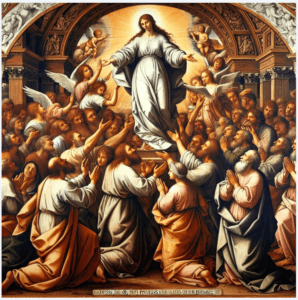 Upon her departure to travel to the land of Canaan to marry Isaac, Rebekah’s family blessed her, their sister, with this poem that may have been a traditional type of wedding blessing for a bride.
Upon her departure to travel to the land of Canaan to marry Isaac, Rebekah’s family blessed her, their sister, with this poem that may have been a traditional type of wedding blessing for a bride.
However, it includes very similar language to the Lord’s promises of blessing to Abraham earlier in Genesis (Genesis 22:17).
Because of God’s promises to Abraham, and because Rebekah would give birth to Jacob, the next in the covenant line of Israel, these blessings on her will absolutely come to pass.
She will become, through her offspring, thousands of ten thousands, and her offspring will conquer their enemies, possessing the gates of their cities.
Her son Jacob will be renamed Israel by God, making Rebekah—literally—the mother of God’s chosen people. This prophecy has already been fulfilled. We are not talking here about unfulfilled, but fulfilled, prophecy.
Genesis 24:61 KJV
And Rebekah arose, and her damsels, and they rode upon the camels, and followed the man: and the servant took Rebekah, and went his way.
 Finally, the servant is able to depart and head back toward Canaan with Rebekah, her nurse, and her servant girls in tow on the ten camels he brought with him.
Finally, the servant is able to depart and head back toward Canaan with Rebekah, her nurse, and her servant girls in tow on the ten camels he brought with him.
God has truly given success to Abraham’s urgent mission to find Isaac an appropriate wife, a mother for the next generation of his offspring (Genesis 24:3–4). This woman will bear a son to Isaac, whom they will name Jacob.
Jacob will later be renamed Israel by God, as the founder of His chosen people. This makes Rebekah, in both a symbolic and literal sense, the “mother of Israel.” They had a long trip back.
We are not told anything about this trip, but I know that it is not easy riding a camel. I rode one from the little village outside of Cairo down to the pyramids—and that’s as far as I want to ride on a camel!
They call them “the ships of the desert” Well, it was as rough as any trip I have ever had on a boat. It was rough! They are not easy to ride, but imagine riding on those camels across the desert. I can see them after a hard day on that hot desert.
At evening they stop at an oasis, the campfire is built, and they have their evening meal. As they are sitting there before going to bed to get their sleep, I hear Rebekah say to this servant, “Tell me about Isaac again.”
The servant says, “What do you want me to tell you?” She says, “Tell me about the way he was born. Tell me about the way his father offered him on the altar.” It was like our song, “Tell me the old, old story of Jesus and His love!”
And the servant says, “I told you that last night.” Rebekah says, “I know, but tell it again. Tell it again.” And so the servant tells it again. It never grows old. That night Rebekah has that sweet sleep, dreaming of the time when she will meet this one.
The next day they start out on the journey again, and the desert isn’t quite as hot, and the camel isn’t quite as rough. But it is a long ways, and so they continue until they finally come in sight of the land of promise. They enter it and come down to Lahai-roi.
Genesis 24:62 KJV
And Isaac came from the way of the well Lahai–roi; for he dwelt in the south country.
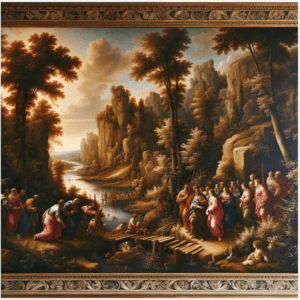 The focus of the story of the marriage of Isaac and Rebekah now turns to Isaac. This if the first we see of him in this chapter. It’s also the first we have seen of him since he was nearly sacrificed by Abraham in obedience to the Lord (Genesis 22:1–14).
The focus of the story of the marriage of Isaac and Rebekah now turns to Isaac. This if the first we see of him in this chapter. It’s also the first we have seen of him since he was nearly sacrificed by Abraham in obedience to the Lord (Genesis 22:1–14).
We will learn later that Isaac is 40 years old (Genesis 25:20). Here we see him living in the Negeb. Either Abraham and his estate had moved again after living in Hebron, or Isaac is living apart from Abraham. He has just returned from Beer-lahai-roi.
This is way down in the pleasant country of Hebron and Beer-sheba.
Genesis 24:63 KJV
And Isaac went out to meditate in the field at the eventide: and he lifted up his eyes, and saw, and, behold, the camels were coming.
 Isaac, 40, is now living in the Negeb region (Genesis 25:20). He surely knows that Abraham’s servant has been sent to find him a wife from among his father’s extended family (Genesis 24:3–4). On this evening, he goes out to meditate in a field.
Isaac, 40, is now living in the Negeb region (Genesis 25:20). He surely knows that Abraham’s servant has been sent to find him a wife from among his father’s extended family (Genesis 24:3–4). On this evening, he goes out to meditate in a field.
Scholars are not exactly sure what is meant by the word translated as “to meditate” here. The term is related to thoughtfulness and communication, but is only used here in the Bible.
Was some form of meditation a regular discipline of Isaac’s or was he just thinking through some things on his mind?
We don’t really know. The English term “meditate” is used to translate other Hebrew words used in a positive sense elsewhere in Scripture (Psalm 1:2; Joshua 1:8), and is not the same as the modern concept espoused by eastern philosophies such as Buddhism.
In any case, Isaac looks up and sees the train of camels coming toward him. This is his first glimpse of Rebekah. In this human episode, we are given a view of the coming of Christ for His bride.
Many people are saying, “Won’t it be wonderful when the Lord comes and we will be caught up with Him?”
There is another view, and that is of those who will be with Him when He comes. Most of the church has already gone through the doorway of death, and they will be coming with Him when He comes.
Their bodies will be raised and their spirits and bodies joined together. Those who are alive are to be caught up with the dead to meet the Lord in the air.
Those who have gone before in death are going to see Him when He arises from the right hand of the Father and starts out to call His church to meet Him in the air. This is the picture, and what a glorious picture it is!
Genesis 24:64 KJV
And Rebekah lifted up her eyes, and when she saw Isaac, she lighted off the camel.
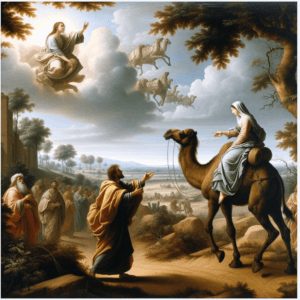 If Isaac were walking, it would have been most unmannerly for her to have continued seated; an inferior, if riding, always alights in presence of a person of rank, no exception being made for women.
If Isaac were walking, it would have been most unmannerly for her to have continued seated; an inferior, if riding, always alights in presence of a person of rank, no exception being made for women.
Led by Abraham’s servant, the train of camels bearing Rebekah and her entourage are approaching Isaac’s home in the Negeb region of Canaan. In the previous verse, he noticed their arrival.
Now Rebekah sees Isaac, whom she is about to marry, for the first time. She quickly dismounts from her camel.
This is the beginning of another excellent sign: Rebekah, without knowing that this is the man she is being brought to marry, finds him interesting enough to stop and ask questions.
Genesis 24:65 KJV
For she had said unto the servant, What man is this that walketh in the field to meet us? And the servant had said, It is my master: therefore she took a vail, and covered herself.
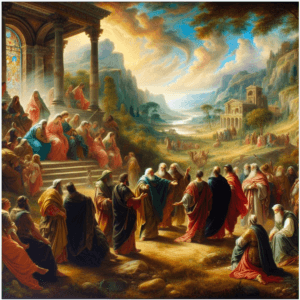 The mission of Abraham’s servant to find and deliver a wife for Isaac from among Abraham’s extended family back in Mesopotamia is nearly complete (Genesis 24:3–4). He leads a train of camels bearing Rebekah and her entourage to Isaac’s home.
The mission of Abraham’s servant to find and deliver a wife for Isaac from among Abraham’s extended family back in Mesopotamia is nearly complete (Genesis 24:3–4). He leads a train of camels bearing Rebekah and her entourage to Isaac’s home.
It is evening. Isaac sees them coming while out in the field and walks into meet them. Rebekah sees Isaac for the first time and quickly dismounts from the camel. She asks the servant who the man is; he confirms that it is his master Isaac.
Rebekah quickly covers her face to hide her features from Isaac since they are not yet married. She may well have kept her face veiled until their wedding.
The veil is an essential part of female dress. In country places it is often thrown aside, but on the appearance of a stranger, it is drawn over the face, as to conceal all but the eyes. In a bride it was a token of her reverence and subjection to her husband.
We as the bride of Christ will have to be clothed with the righteousness of Christ, but He has been made over to us righteousness.
He was delivered for our offenses, and He was raised for our justification in order that we might have a righteousness which will enable us to stand before God. Rebekah, seeing a man walking toward them, asks who he is.
Throughout the long journey she has come to know about him, but now she is to see him face to face. This is similar to our position even now. As Peter expressed it, “Whom having not seen, ye love . . .” (1 Peter 1:8).
I wonder: When He does come, are we going to know Him?
Genesis 24:66 KJV
And the servant told Isaac all things that he had done.
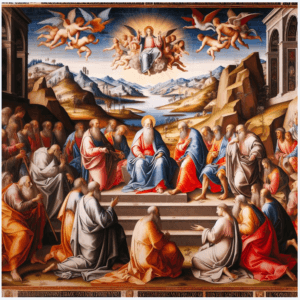 Having completed his mission, Abraham’s servant made his report to Isaac of all he had done and all that had happened along the way.
Having completed his mission, Abraham’s servant made his report to Isaac of all he had done and all that had happened along the way.
Given the repetition and detail in the servant’s speech to Rebekah’s family earlier in this chapter (Genesis 24:34–49), it is unlikely he left anything out.
It is very likely that he gave full credit to the Lord for leading him to Rebekah, for the family’s approval of the marriage, and for bringing Rebekah to Isaac on this very evening.
Why did the servant make his report to Isaac instead of Abraham?
Some believe Abraham may well have died by this point, though the ages given in the Bible make it clear Abraham lived another 35 years after Isaac married Rebecca (Genesis 21:5; 25:20; 25:7).
It’s most likely that Abraham was simply in another location when the servant arrived and would receive the same report at another time.
The Holy Spirit has sealed us and will deliver us to Christ at the day of redemption. Believe me, it was certain that this servant of Abraham’s was going to get the bride to Isaac. Now this is the union of Isaac and Rebekah—
Genesis 24:67 KJV
And Isaac brought her into his mother Sarah’s tent, and took Rebekah, and she became his wife; and he loved her: and Isaac was comforted after his mother’s death.
 Thus establishing her at once in the rights and honors of a wife before he had seen her features. Disappointments often take place, but when Isaac saw his wife, “he loved her.”
Thus establishing her at once in the rights and honors of a wife before he had seen her features. Disappointments often take place, but when Isaac saw his wife, “he loved her.”
Here, the story of the wedding of Isaac and Rebekah reaches its conclusion. In this moment, Isaac and Rebekah seem to step into the shoes of Abraham and Sarah. He gives her his mother’s tent. He soon marries her and begins to love her.
Their relationship comforts him in the loss of Sarah. This is the first mention of Isaac’s emotional response to his mother’s death, which took place approximately three years before his marriage to Rebekah.
The following chapter will describe the death of Abraham. Isaac will now become the patriarch of the family of the people of God. “And he loved her”—Christ loved the church and gave Himself for her.
“And Isaac was comforted after his mother’s death.” This reveals to us that Christ gains a great deal in our salvation. He wants us; He longs for us. Oh, that you and I might be faithful to Him, my beloved!
I hope that you have really enjoyed this post,
Please Leave All Comments in the Comment Box Below ↓













Hi,
Your detailed analysis and clear explanations helped me understand the cultural and historical context of the story, particularly how Abraham’s servant Eliezer’s faith and obedience played a crucial role in fulfilling God’s promise.
The review enriched my understanding of the significance of this story in the broader biblical narrative, highlighting themes of faith, divine providence, and the importance of adhering to God’s guidance.
Regards
Nouman
Hello Nouman,
I am very pleased to learn that my detailed analysis and clear explanations on Isaac’s Bride – The Sworn Oath has helped you understand the cultural and historical context of the story.
It is my goal to keep putting content like this together for the purpose of enrichment of biblical understanding.
The HBS & DwJ Mission: To train sisters and brothers in Christ, to spread GOD’s Love and create Disciples.
The HBS & DwJ Vision: To share all resources that will aid in the knowledge for the building of GOD’s kingdom.
Please visit us again,
Blessings My Friend!
The story of Isaac and Rebekah in Genesis 24 is a pivotal moment in the second division of Genesis, which transitions from the great events of the early chapters to the lives of key patriarchs.
This chapter focuses on Isaac, the beloved son of Abraham, and marks a significant milestone in his life: obtaining a bride. The narrative highlights three major events in Isaac’s life: his birth, his near-sacrifice, and now his marriage. It underscores a broader theme about the three major events in any man’s life—birth, marriage, and death—with an emphasis on marriage as a chosen event, albeit sometimes influenced by external factors.
Abraham’s directive to his servant to find a bride for Isaac from his homeland, rather than from the Canaanites, demonstrates a deep trust in God’s guidance and a desire to maintain the purity of his lineage. The servant’s mission to Mesopotamia to secure Rebekah showcases a beautiful love story intertwined with divine providence.
This chapter is rich with theological and practical implications. It emphasizes that God is intimately involved in the details of our lives, including whom we marry. The institution of marriage, alongside human government, is depicted as a cornerstone of societal stability. The narrative suggests that the strength of a society is closely linked to the health of its families and governance.
The story of Isaac and Rebekah also serves as a spiritual metaphor, illustrating the idea that just as God guided the servant to Rebekah, He can lead us in our personal lives. The detailed account of Rebekah becoming Isaac’s wife underscores the importance of seeking and following God’s direction in major life decisions.
Overall, Genesis 24 is not just a historical account but a timeless reminder of God’s sovereignty and care in our personal and communal lives. It encourages readers to trust in God’s guidance, particularly in the foundational aspects of life such as marriage, which God designed to provide strength and stability to human society.
Hello Aparna,
Welcome to the HBS & DwJ platform. I really appreciate your comment!
Thank you so much! I’m glad you enjoyed Isaac’s Bride – The Sworn Oath so much, as a matter of fact, it seems you have really been inspired by the information given here enough to add your own value of knowledge to this platform, making it greater than it already is.
Isn’t it captivating? I loved the intricate plot twists and character development during this biblical study. Wow, I just love it when someone, such as yourself, gets a hold on this information. because the value you add with your comment is priceless.
Thank you for being the Blessing You Are to this platform,
Blessings My Friend!
You did an amazing job bringing the story of Isaac’s bride to life.
I loved how you highlighted the significance of the sworn oath and the cultural practices of the time – it really added depth to the narrative. Your explanation of the spiritual lessons we can learn from this story was also very insightful.
I’m curious, do you have any favorite interpretations of this story from different theologians?
And what do you think is the most important takeaway for modern readers?
Thanks.
Hello Bob,
It pleases me to learn that you love highlighted significances in this study.
No, I do not have any favorite interpretations of this story from different theologians, however, the story of Isaac and Rebekah is not as extensive in scripture as the story of Abraham and Sarah, we still see the impact their faith had on their lives. Like all of us their trust in God was not lived out perfectly, yet they were still an intricate part of God’s purpose for the future nation of Israel and for the rest of the world.
If there is one last thing to rejoice over is that all throughout history God has used imperfect people to carry out his perfect plan. Thankfully he is still doing that today. He uses you and I as imperfect vessels to accomplish his perfect will. When you understand how big and all-encompassing his plan is, this should not only be humbling, but we should be grateful that we can be a part of it, just like Isaac and Rebekah were.
Hope this helps,
Blessings My Friend!
What are the four great events covered in the first division (chapters 1-11) of Genesis?
Who are the four outstanding individuals focused on in the second division (chapters 12-50) of Genesis?
What significant role does Abraham’s servant play in Genesis 24?
What does the story of Isaac and Rebekah teach about following God’s leading in one’s personal life?
The first division of Genesis (chapters 1-11) covers four major events:
1. **Creation** (Genesis 1-2): The account of God creating the world in six days and resting on the seventh. This includes the creation of the heavens and the earth, light, land, seas, plants, animals, and humanity.
2. **The Fall** (Genesis 3): The story of Adam and Eve’s disobedience in the Garden of Eden, leading to sin entering the world and the expulsion from Eden.
3. **The Flood** (Genesis 6-9): The narrative of Noah and the great flood sent by God to cleanse the earth of its corruption, followed by the covenant God makes with Noah and his descendants.
4. **The Tower of Babel** (Genesis 11): The account of humanity’s attempt to build a tower reaching to the heavens and God’s intervention by confusing their language and scattering them across the earth.
These events set the stage for the rest of the biblical narrative, introducing themes of creation, sin, judgment, and the spread of humanity.
In the second division of Genesis (chapters 12-50), the focus shifts to four outstanding individuals:
Abraham (chapters 12-25): Abraham is introduced as the father of the Hebrew people. His story includes the covenant God makes with him, the promise of land and descendants, and significant events such as his journey to Canaan, the birth of Isaac, and the near-sacrifice of Isaac.
Isaac (chapters 21-27): Isaac, the son of Abraham and Sarah, is the second patriarch. His narrative includes his marriage to Rebekah, the birth of his sons Esau and Jacob, and the blessing of Jacob over Esau.
Jacob (chapters 25-36): Jacob, also known as Israel, is the son of Isaac and Rebekah. His story includes his acquisition of Esau’s birthright, his marriages to Leah and Rachel, his twelve sons who become the heads of the twelve tribes of Israel, and his name change to Israel.
Joseph (chapters 37-50): Joseph, one of Jacob’s sons, is known for his coat of many colors, his rise to power in Egypt after being sold into slavery by his brothers, and his eventual reconciliation with his family. His story highlights themes of providence and forgiveness.
These individuals are key figures in the biblical narrative, each contributing significantly to the development of the Israelite people and their relationship with God.
In Genesis 24, Abraham’s servant plays a crucial role as a mediator in securing a wife for Isaac, Abraham’s son. This chapter is significant because it demonstrates the importance of finding a suitable spouse within the family line, ensuring that Isaac marries someone from Abraham’s kin rather than from the Canaanites.
Here’s a summary of the servant’s role:
Mission Assignment: Abraham sends his senior servant (often identified as Eliezer of Damascus, though he is not named in this chapter) to find a wife for Isaac from Abraham’s relatives in Mesopotamia, specifically from the family of Abraham’s brother Nahor.
Prayer and Guidance: The servant prays for guidance from God, asking for a sign to identify the right wife for Isaac. He requests that the chosen woman will offer water to him and his camels, which would indicate her kindness and suitability.
Finding Rebekah: The servant meets Rebekah at a well, and she fulfills the sign he had prayed for by offering water to him and his camels. This act of kindness confirms that she is the chosen one.
Negotiations and Blessings: The servant then negotiates with Rebekah’s family and secures her consent to return to Canaan and marry Isaac. Rebekah agrees, and the servant takes her back to Isaac.
The chapter emphasizes the servant’s faithfulness, prayerful dependence on God, and his role in ensuring the continuation of Abraham’s lineage through Isaac.
The story of Isaac and Rebekah in Genesis 24 provides several lessons about following God’s leading in one’s personal life:
Seeking Divine Guidance: The narrative demonstrates the importance of seeking God’s guidance in significant decisions. Abraham’s servant prays for direction and a clear sign to find the right wife for Isaac. This act of seeking divine intervention highlights the value of asking for God’s guidance in personal decisions.
Trust and Obedience: Abraham’s servant follows Abraham’s instructions meticulously and shows trust in God’s provision. His obedience to Abraham’s command and reliance on God’s guidance underscore the importance of faith and adherence to divine direction.
Faith and Patience: The servant waits patiently for God’s answer and remains attentive to the sign he requested. This teaches that following God’s leading may require patience and attentiveness, trusting that God will provide clear direction in His timing.
Recognition of God’s Provision: When Rebekah fulfills the servant’s request, he recognizes it as an answer to his prayer and a sign of God’s provision. This highlights the importance of acknowledging and being grateful for God’s answers and guidance when they come.
Alignment with God’s Plan: The story illustrates that personal decisions should align with God’s broader plan and purposes. The choice of Rebekah as Isaac’s wife ensures that God’s covenant promise to Abraham continues through a suitable partner, demonstrating the importance of aligning personal choices with God’s overarching plan.
Overall, the story emphasizes a model of seeking God’s guidance, being patient, recognizing His provision, and ensuring that personal decisions align with His will.
Hello,
I found the exploration of the cultural and spiritual context behind the selection of Isaac’s bride to be particularly insightful.
The way you connected the historical aspects with the enduring lessons of faith and obedience truly resonated with me. It’s intriguing to consider how the servant’s reliance on divine intervention mirrors the faith journey we are all on. I would love to hear your thoughts on how this narrative can inspire modern believers in their daily walk with God.
I have two questions about the context:
How does the story of Isaac’s bride illustrate the broader themes of faith and divine guidance in the Bible?
And, what do you think is the significance of Abraham’s servant’s prayer and its immediate fulfillment in finding Rebekah?
Best regards,
Gabriel John
Hello Gabriel John,
Thank you for your thoughtful reflection! I’m glad the exploration of Isaac’s bride resonated with you.
The story of Isaac’s bride, Rebekah, beautifully illustrates the themes of faith and divine guidance throughout the Bible. The journey of Abraham’s servant to find a wife for Isaac is not just a narrative about matchmaking but a profound demonstration of God’s provision and faithfulness.
The servant’s reliance on prayer and divine direction highlights how faith is integral in seeking and recognizing God’s guidance. This story can inspire modern believers by showing that even in seemingly mundane tasks, we can experience God’s active involvement and guidance, reinforcing our trust in His plan for our lives.
Regarding the significance of the servant’s prayer and its immediate fulfillment, it’s a powerful testament to the importance of aligning our requests with God’s will and trusting in His timing. The servant’s specific prayer demonstrates a deep faith in God’s ability to provide clear answers, and the swift fulfillment of his request underscores that God is attentive to our needs and responds in ways that affirm His presence and power.
This incident can encourage believers to approach their own prayers with sincerity and trust, knowing that God listens and responds in ways that are perfect and timely.
I hope this perspective adds to your understanding and inspires your faith journey!
Best regards,
Blessings My Friend!